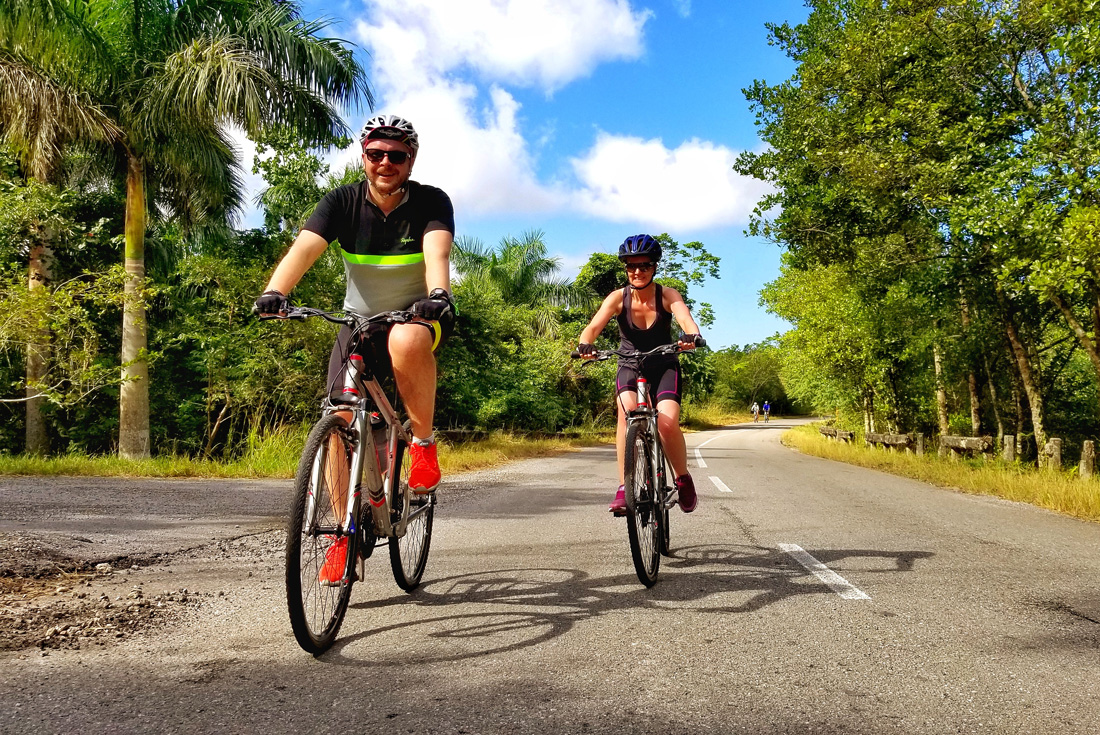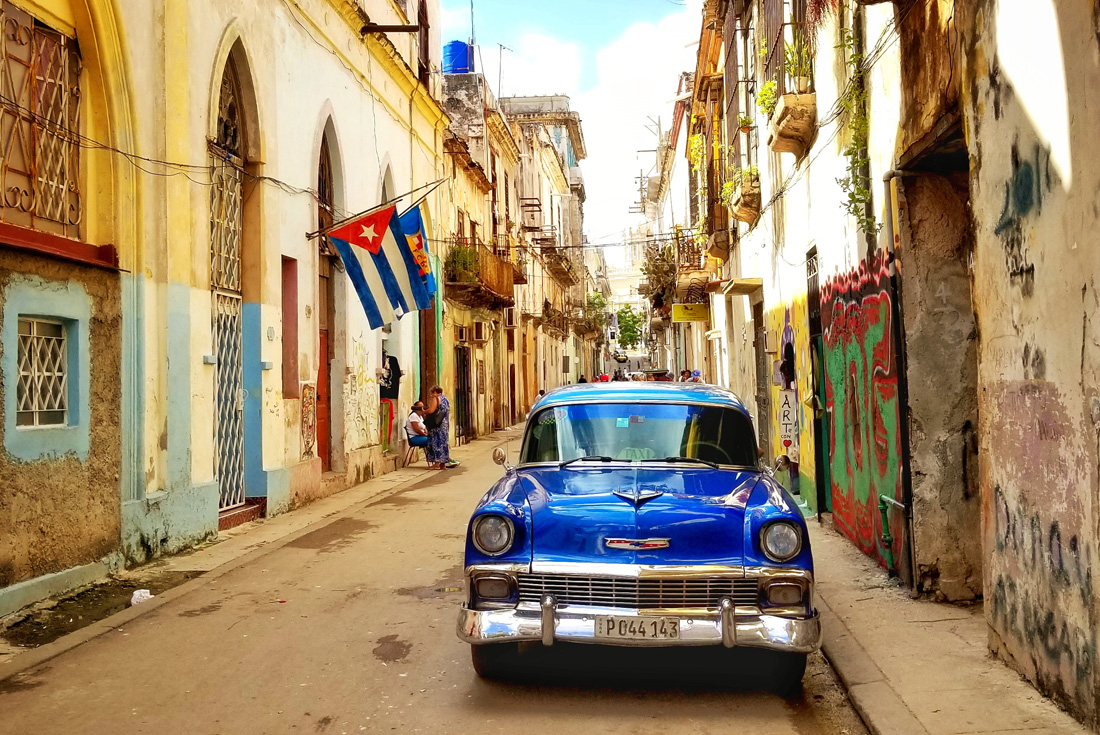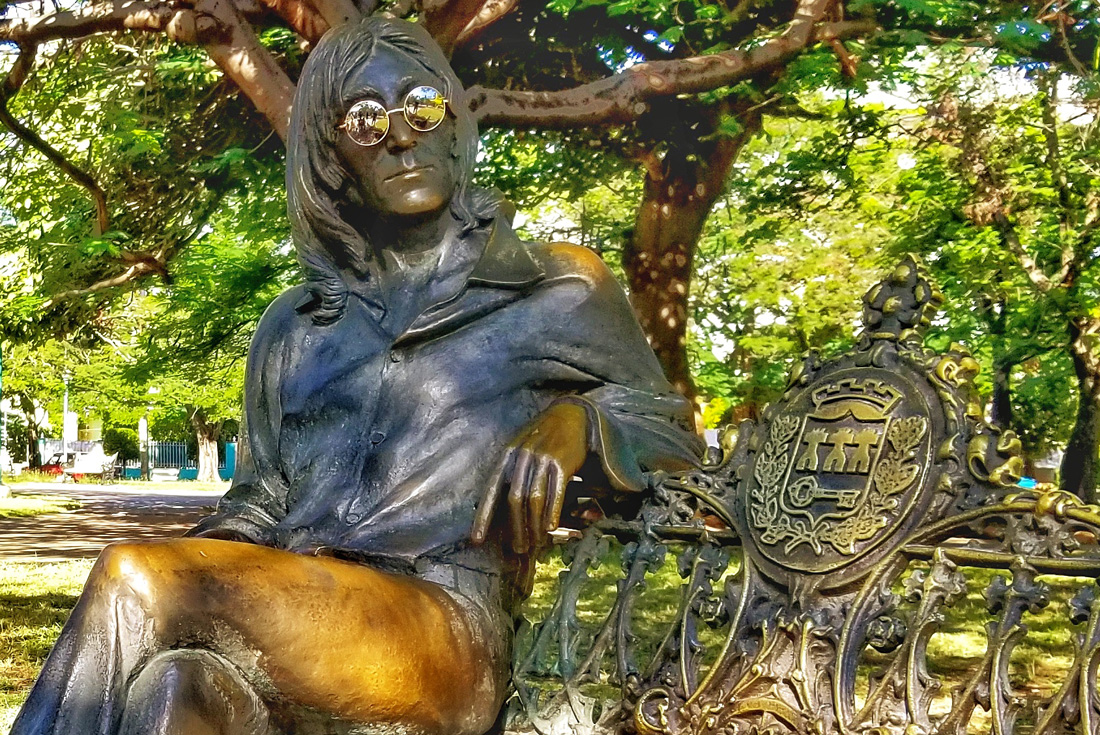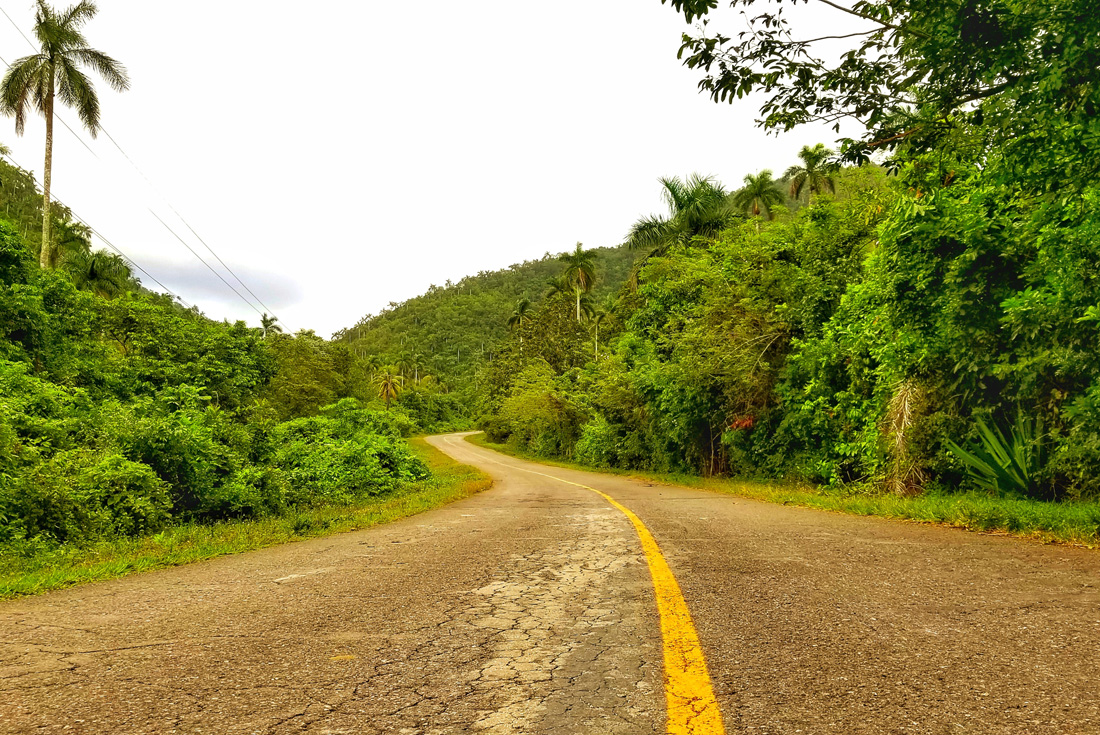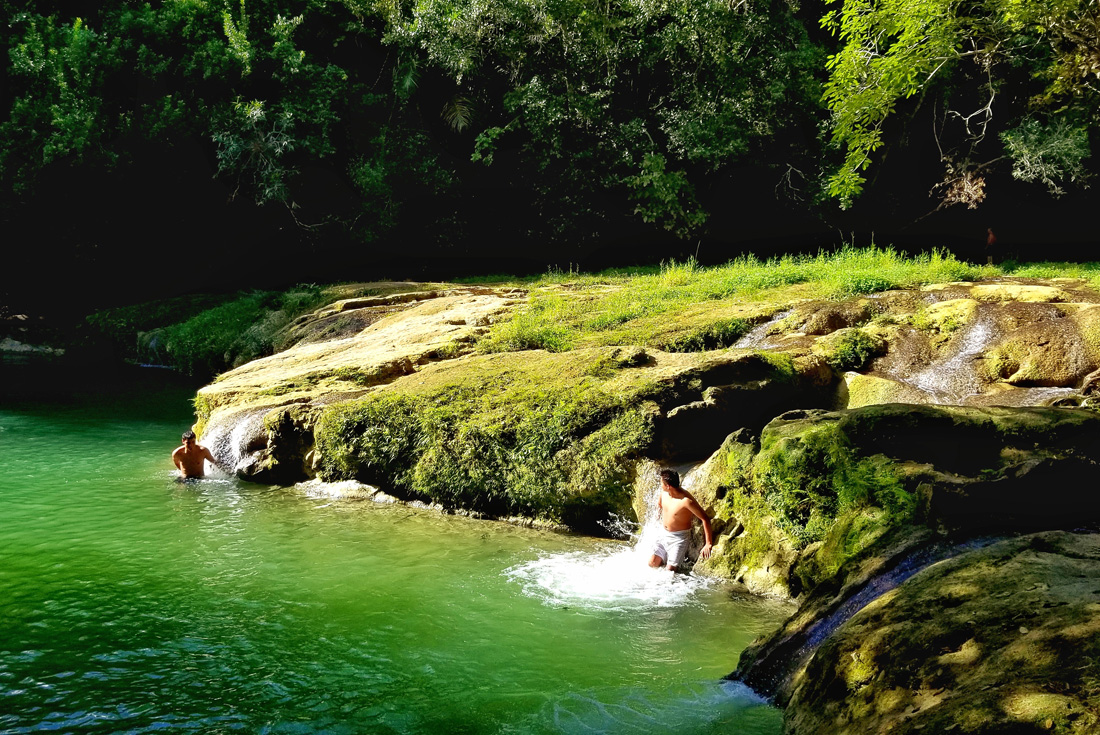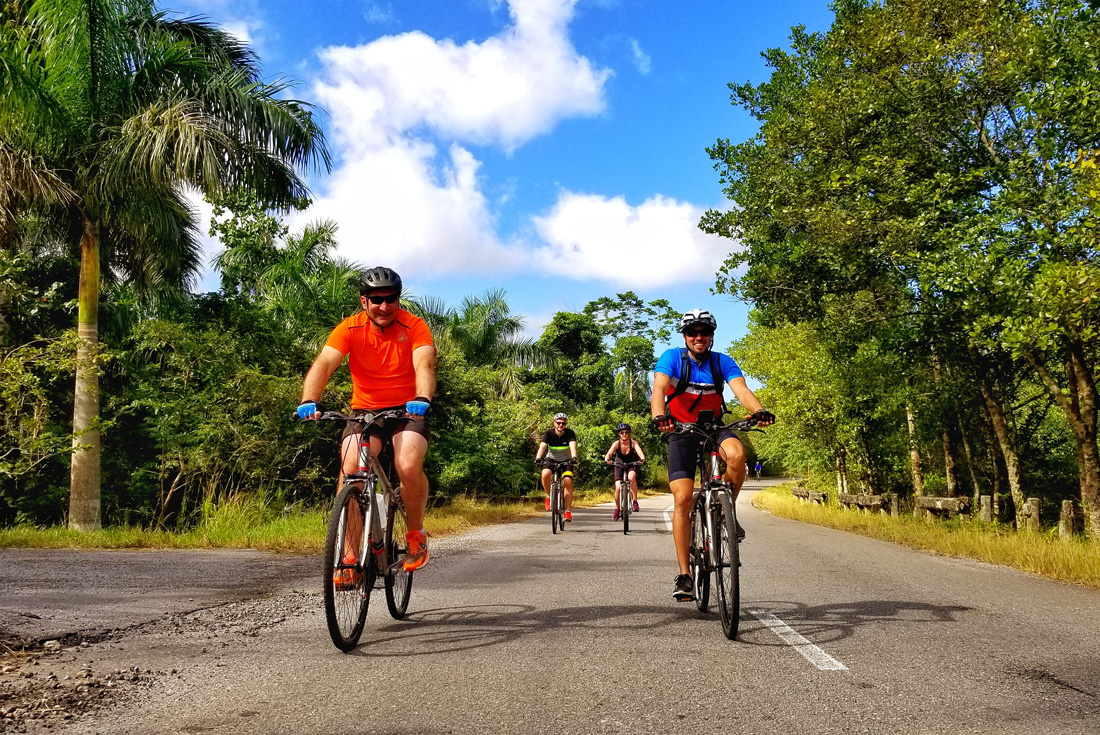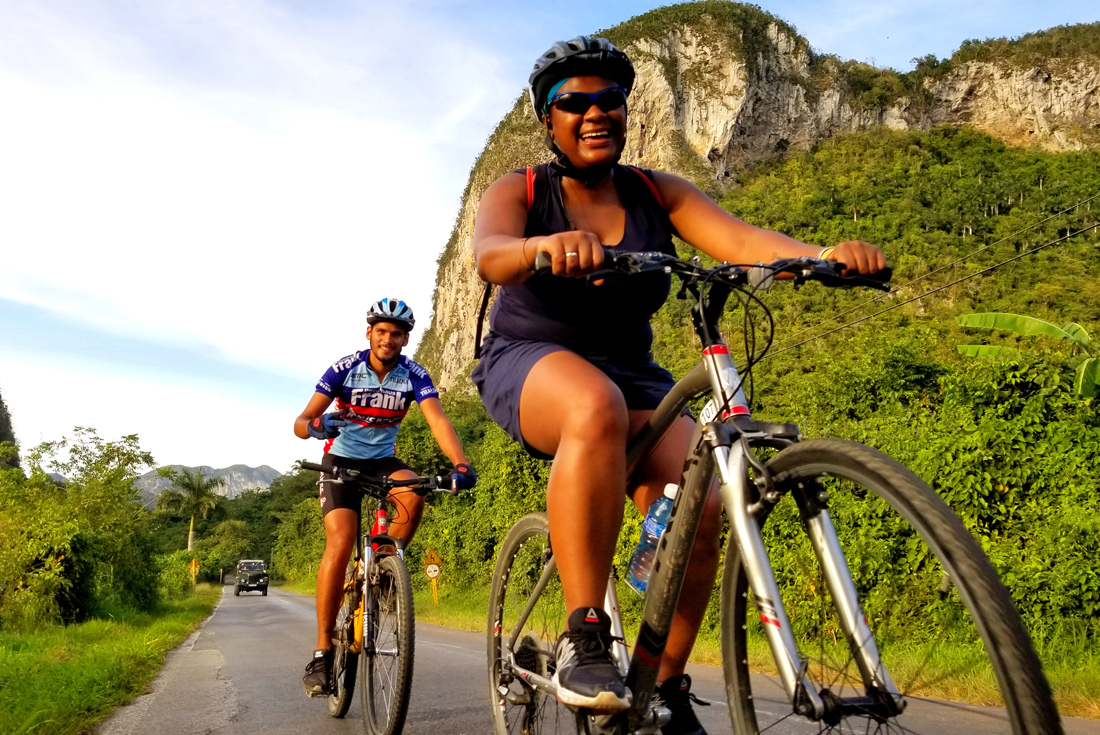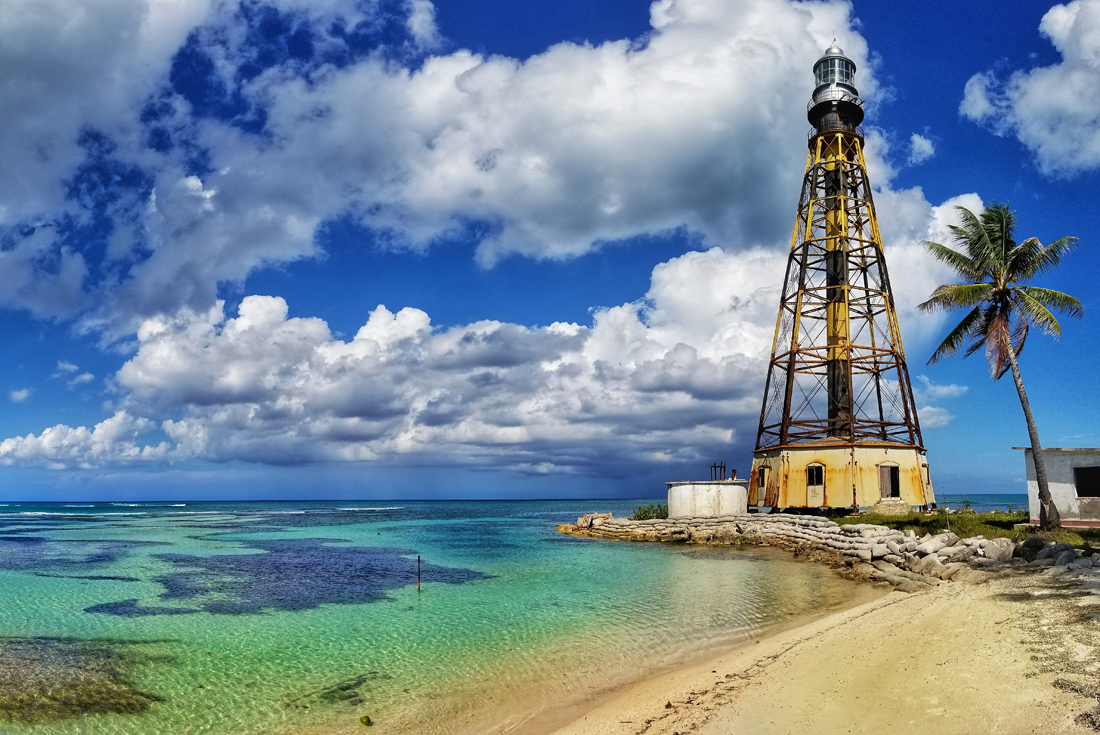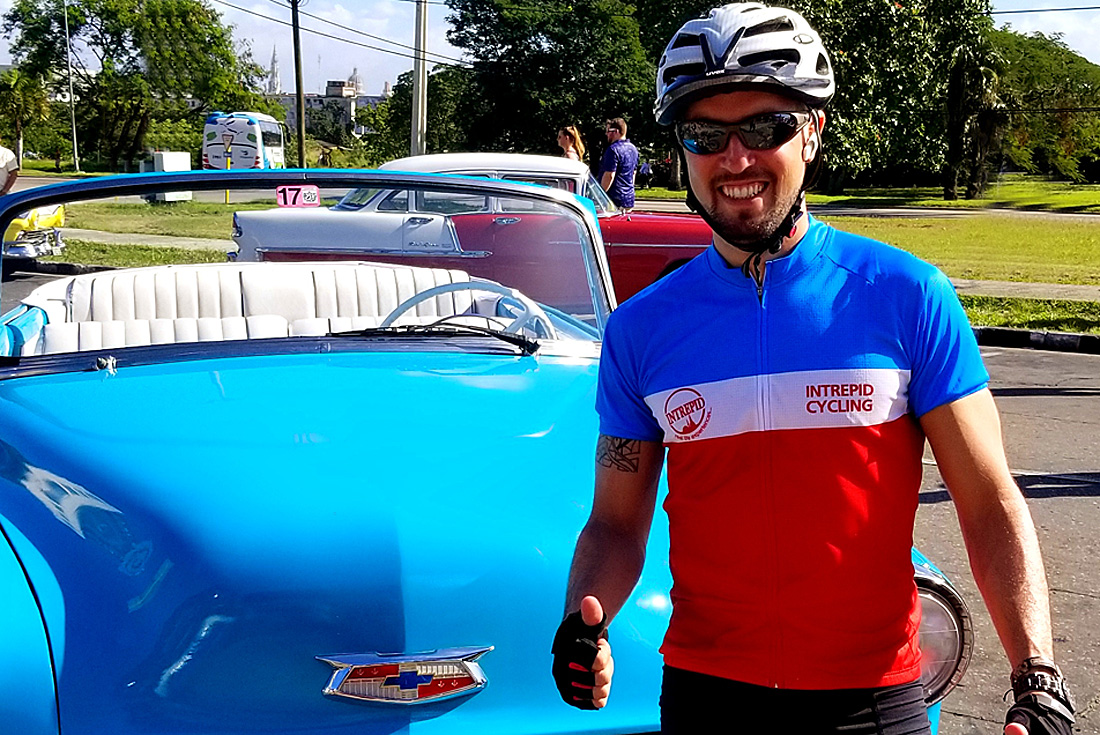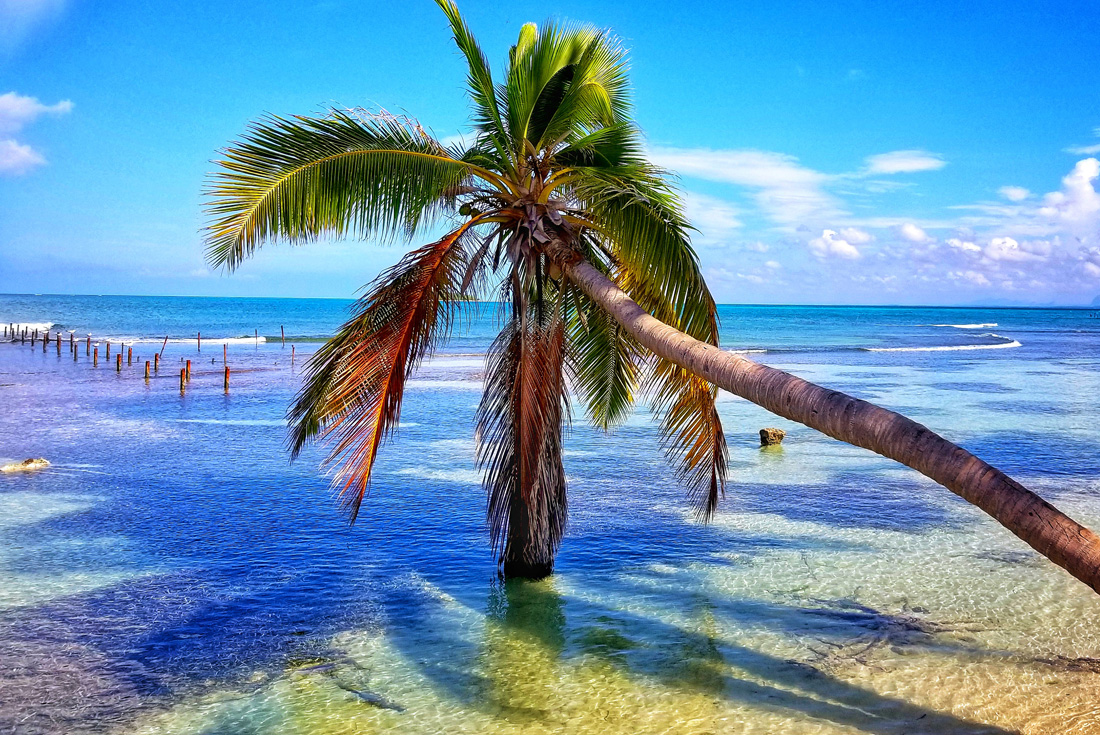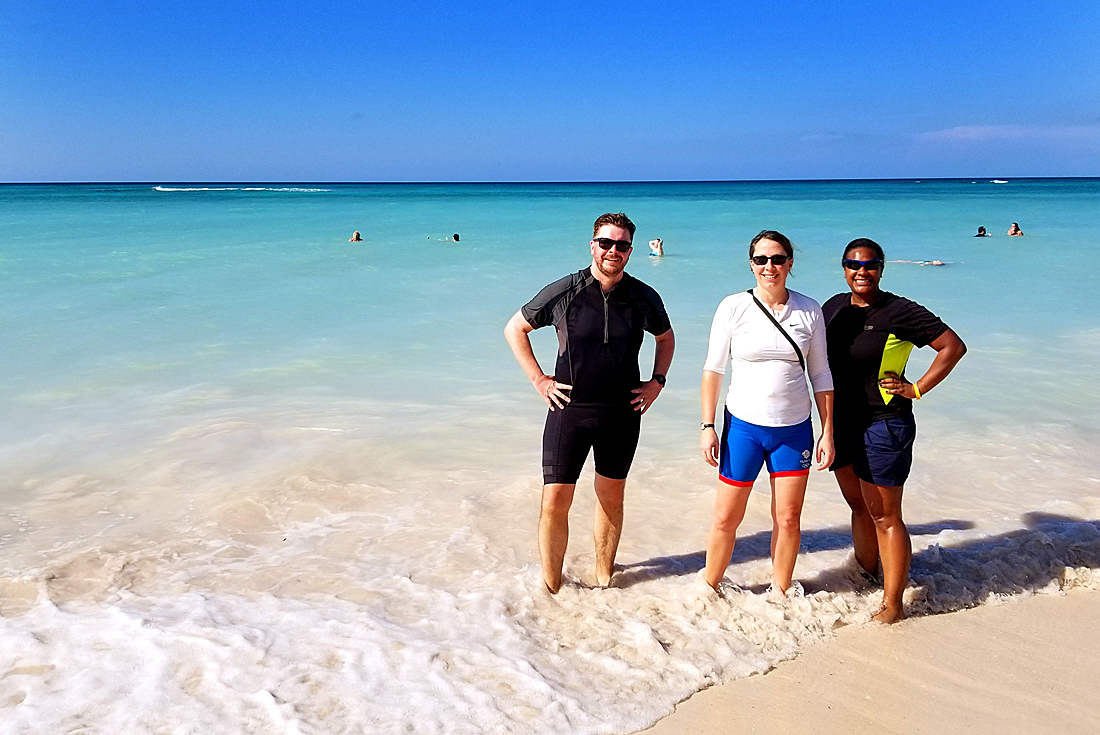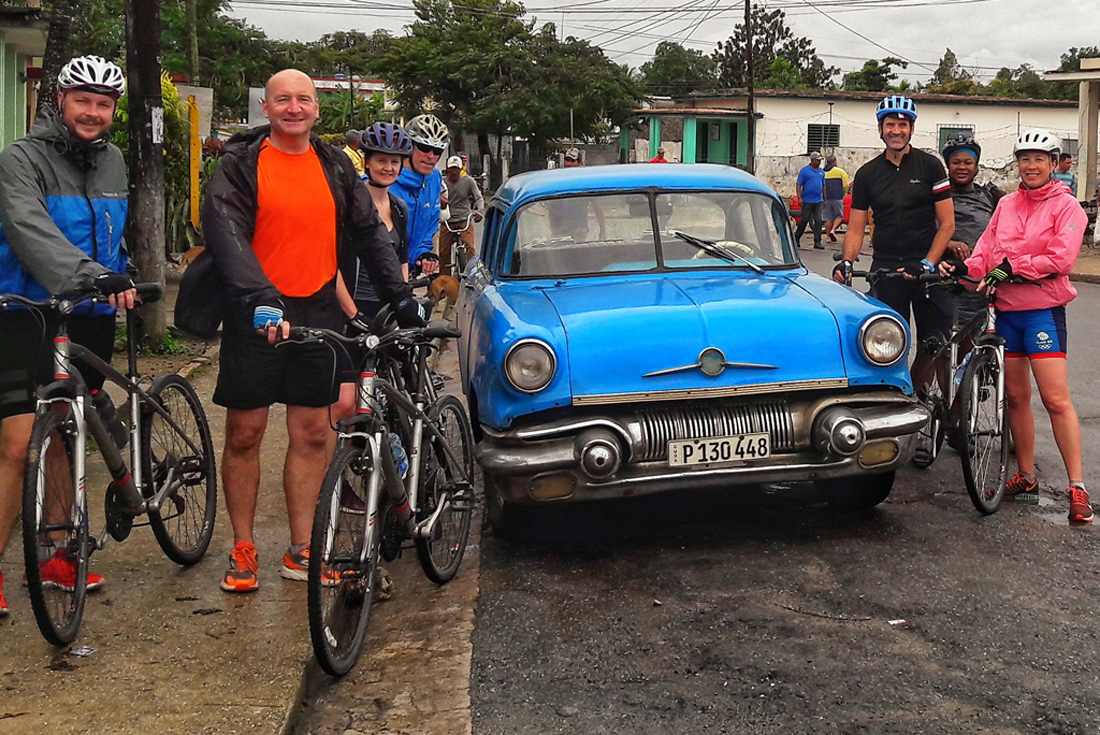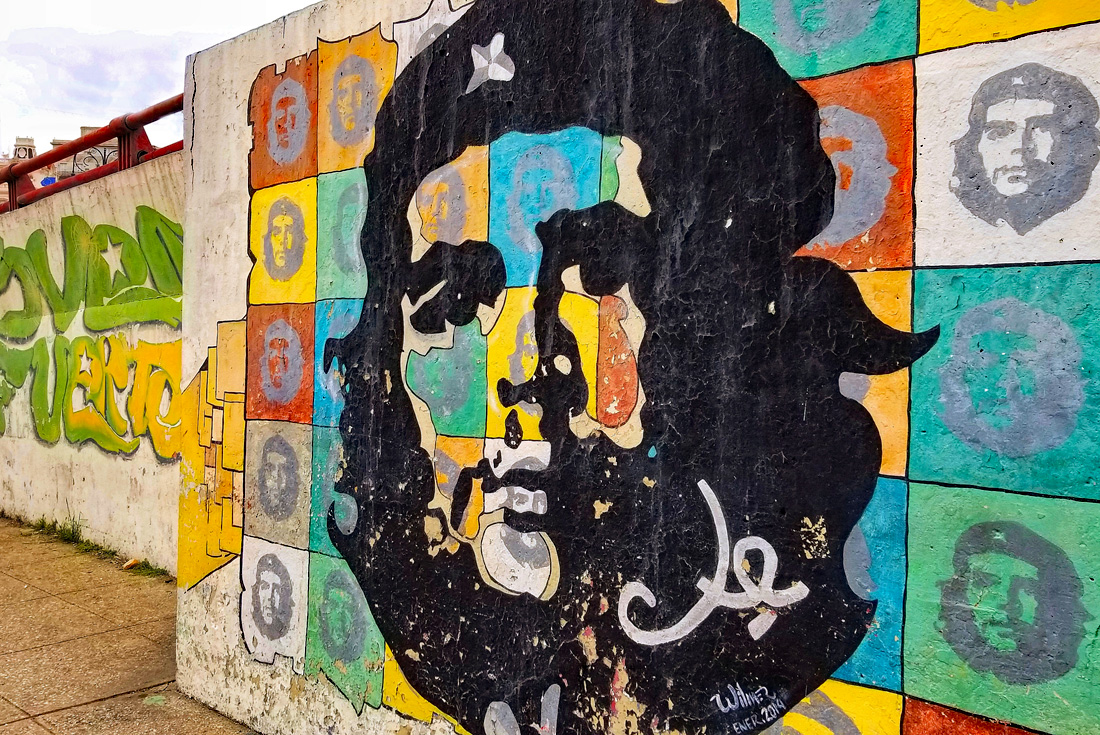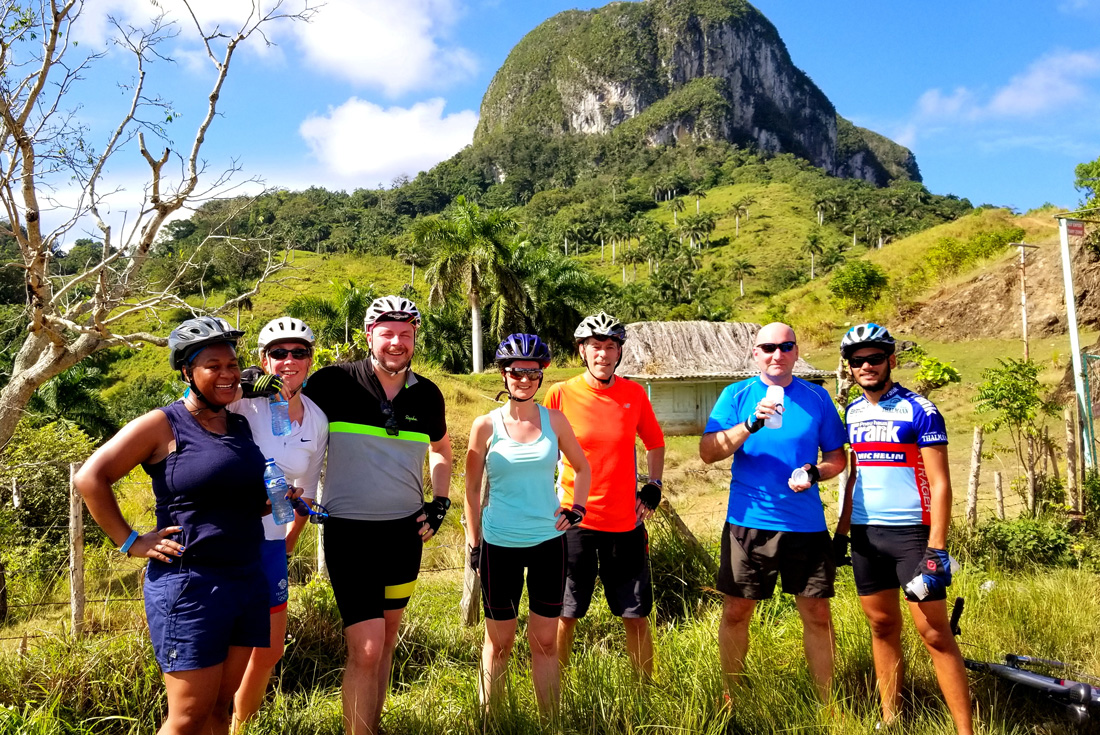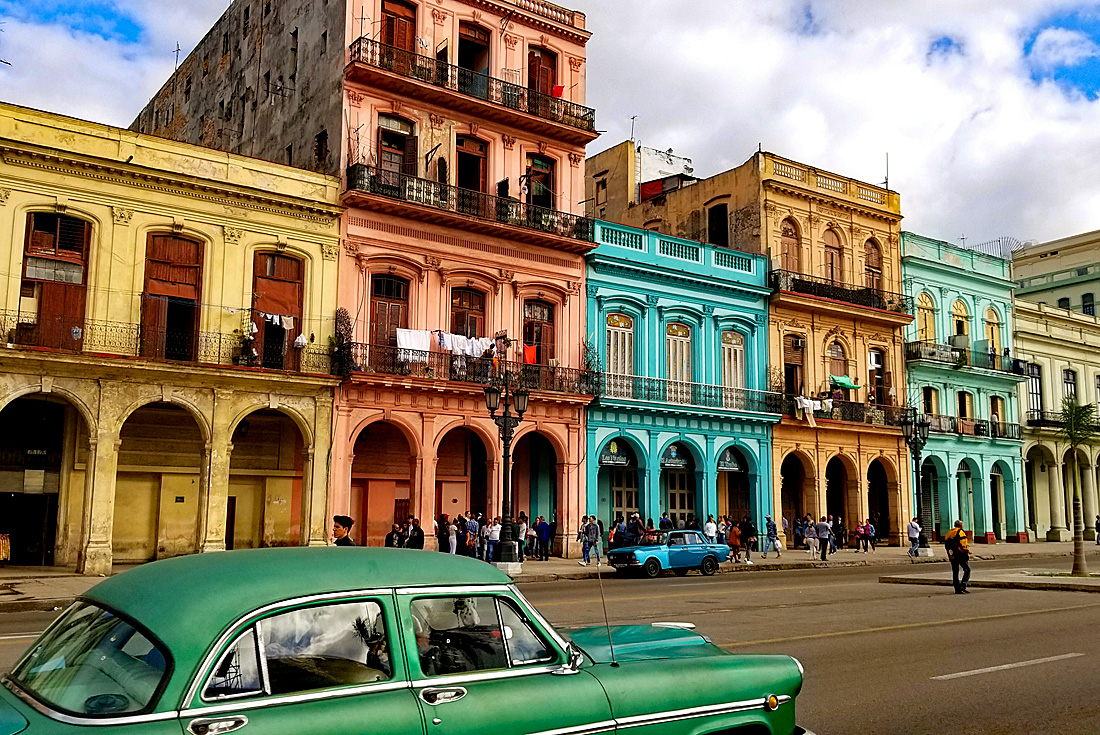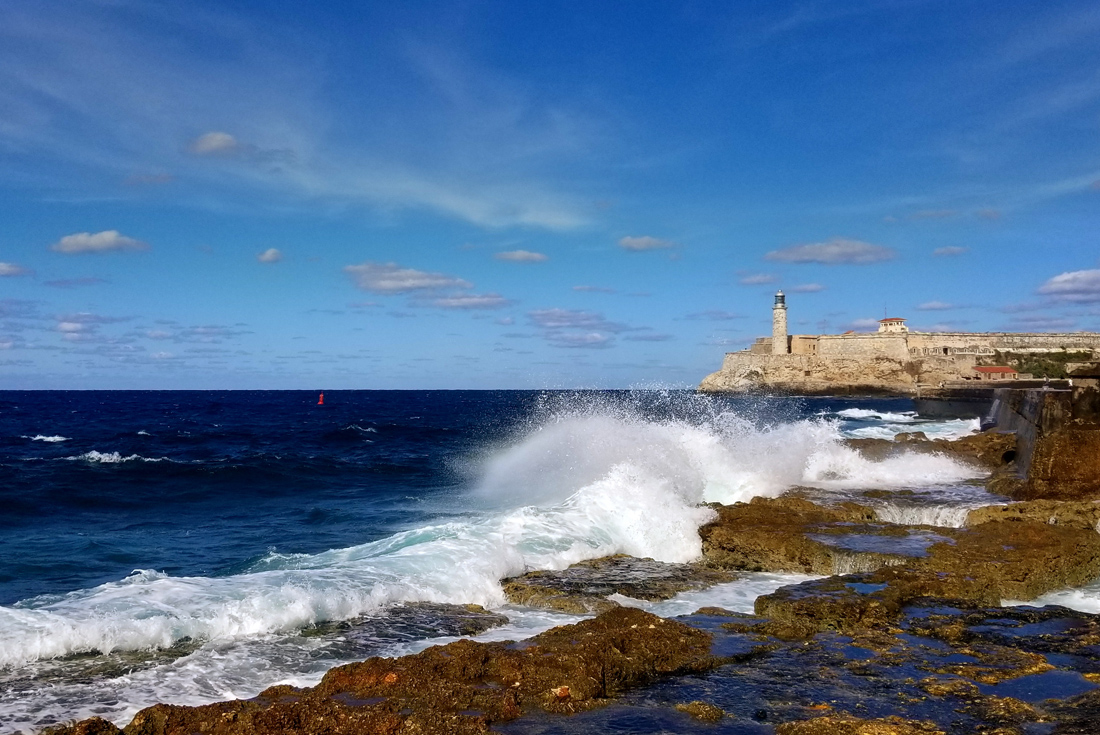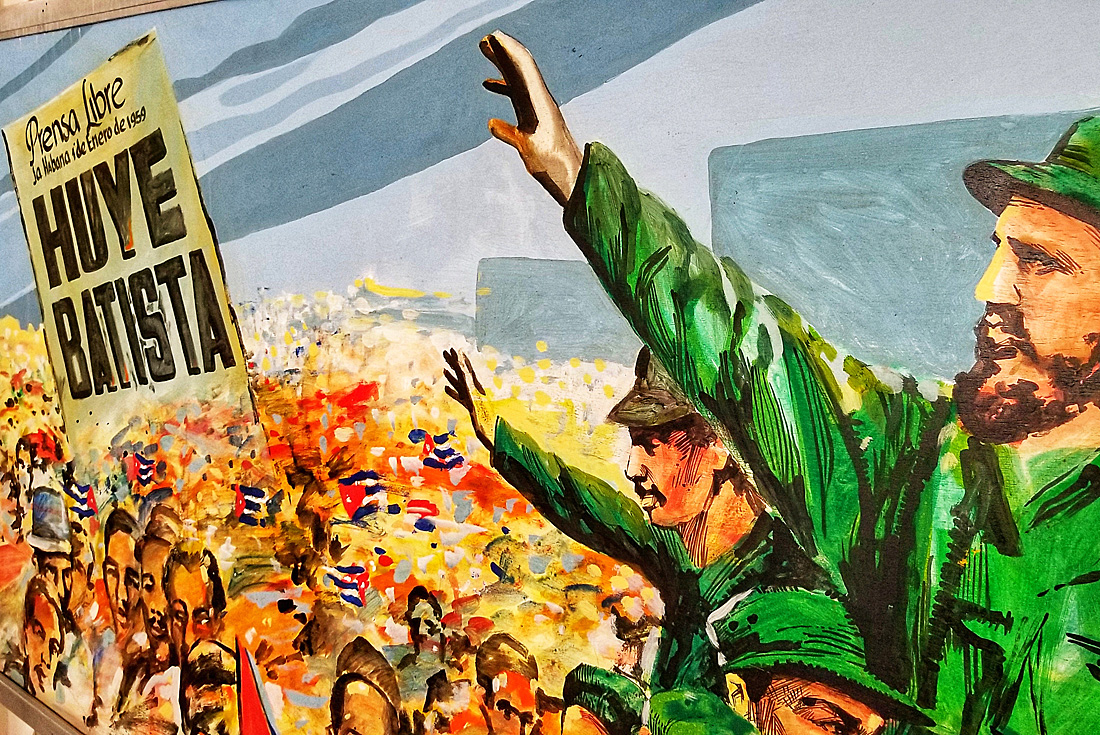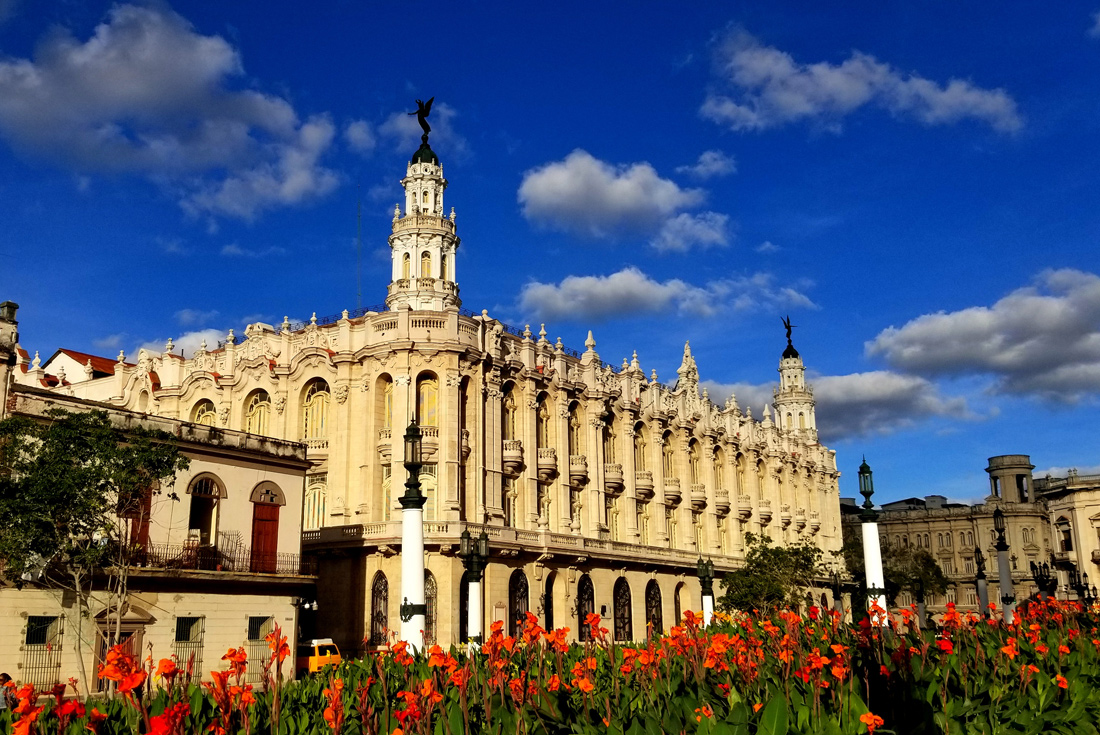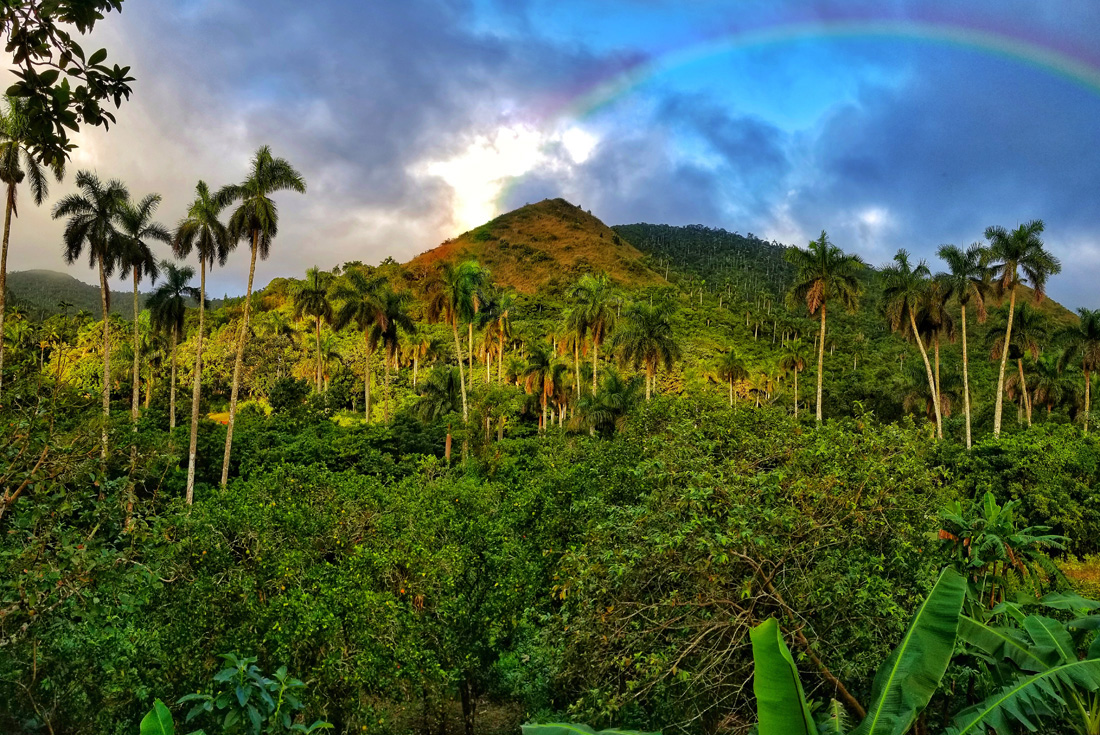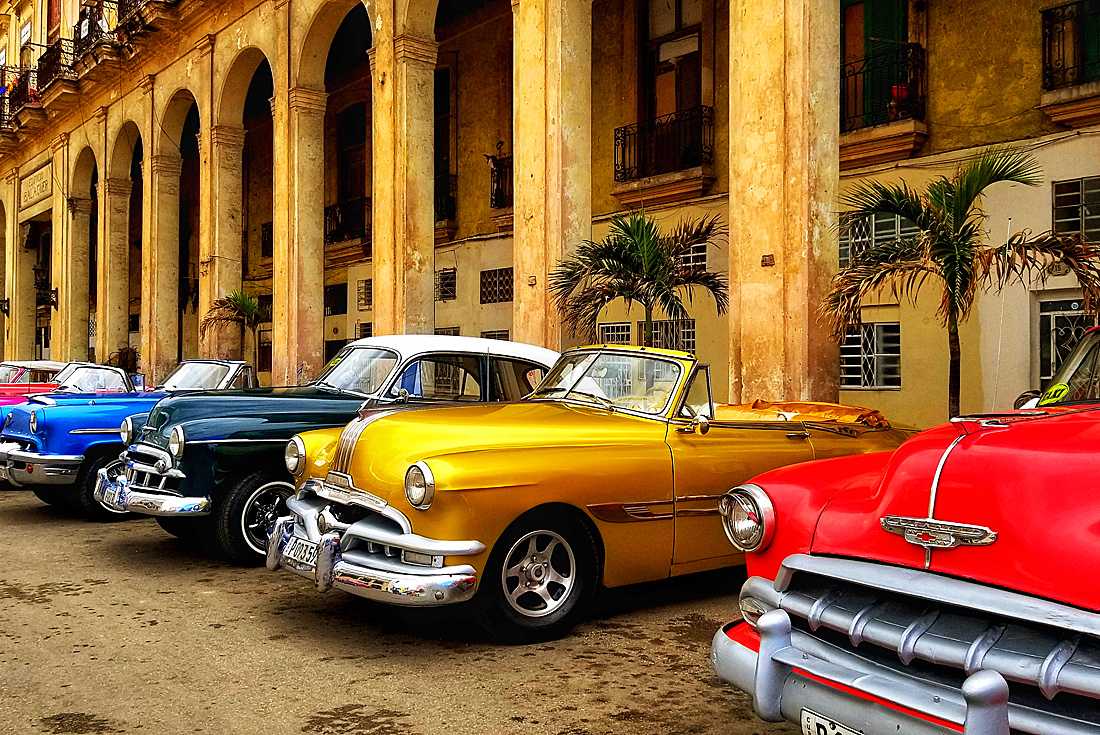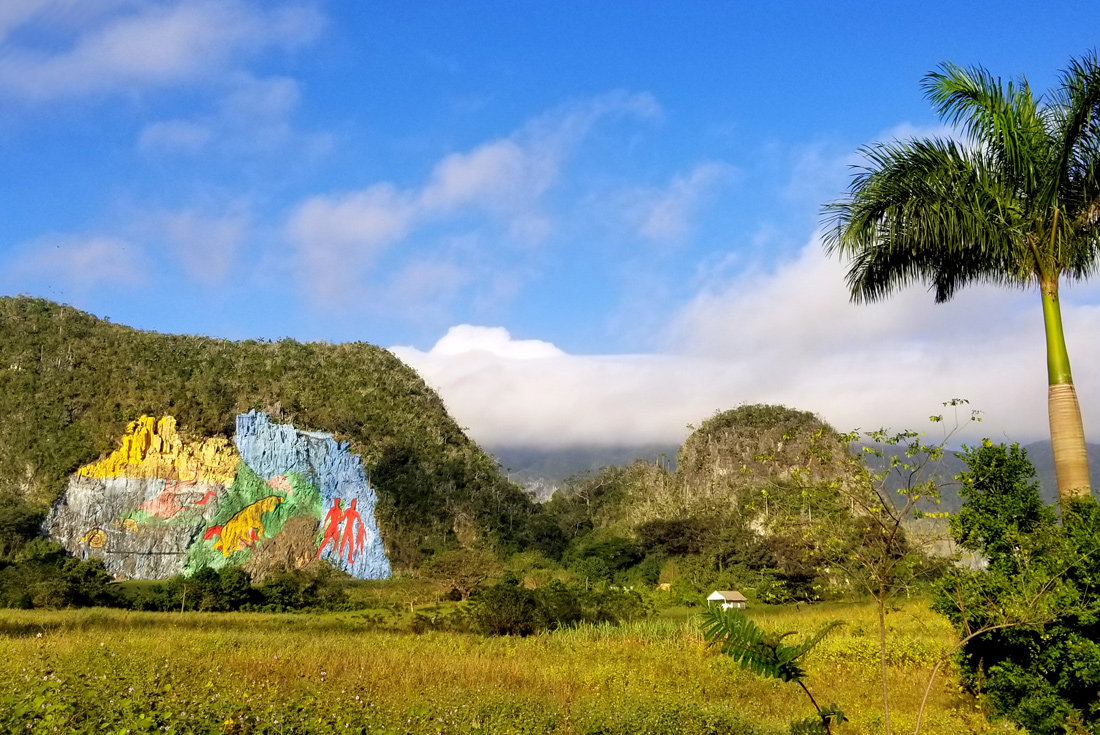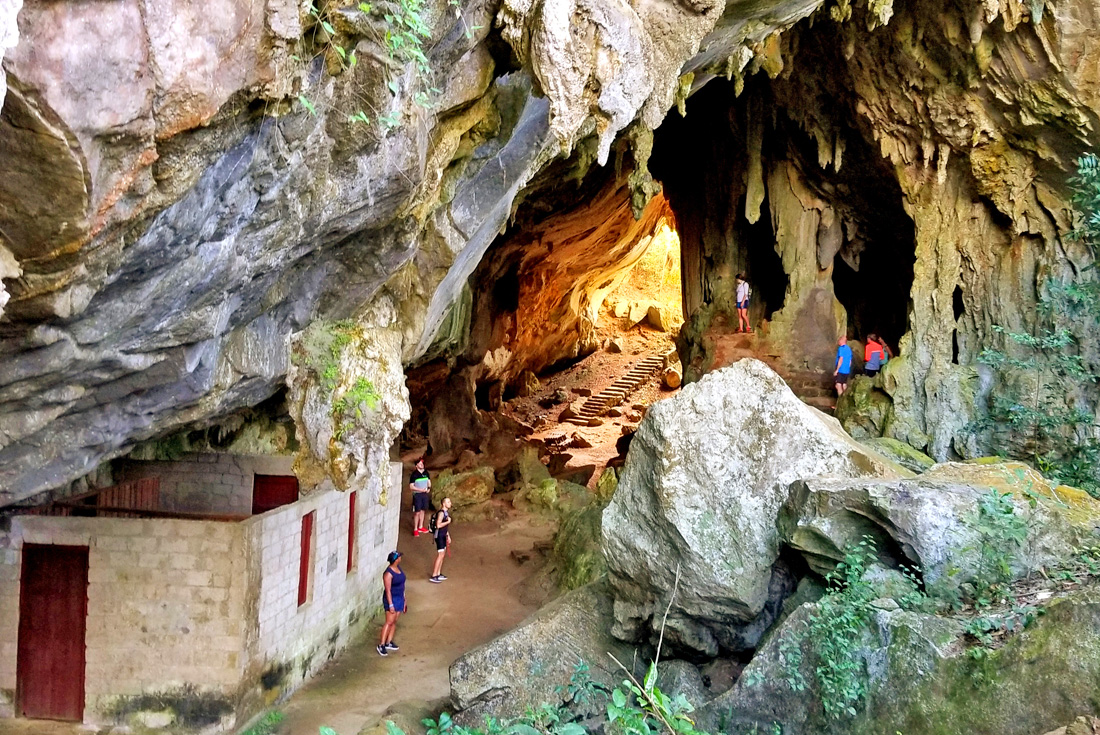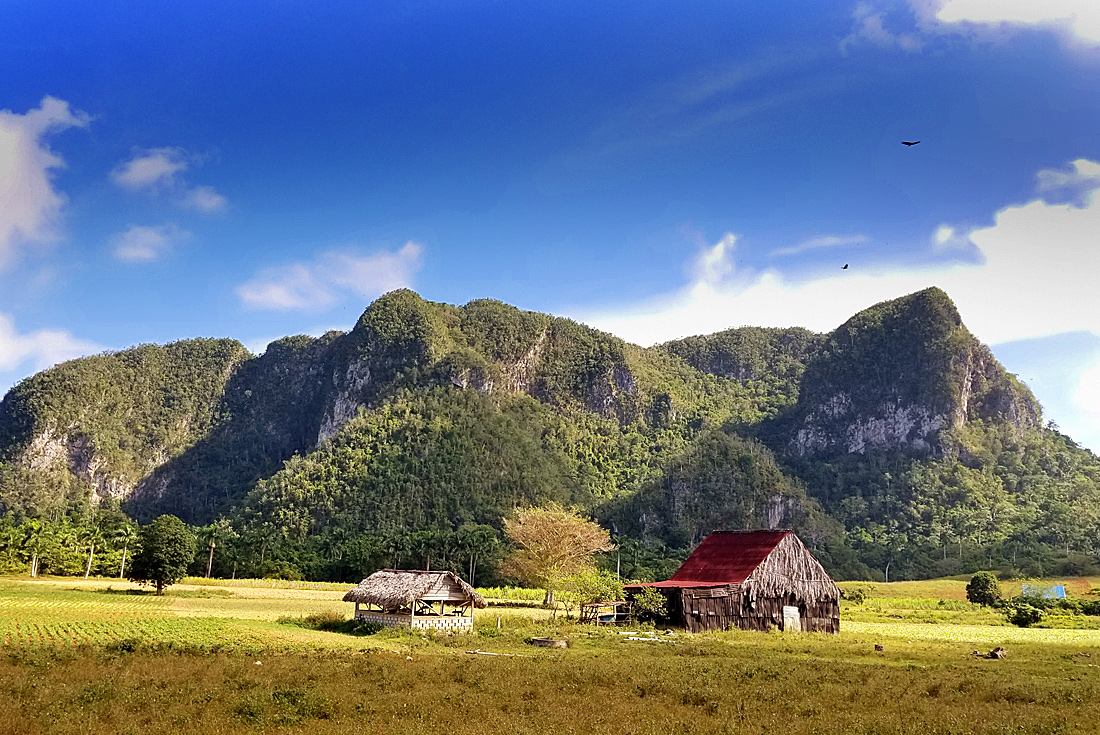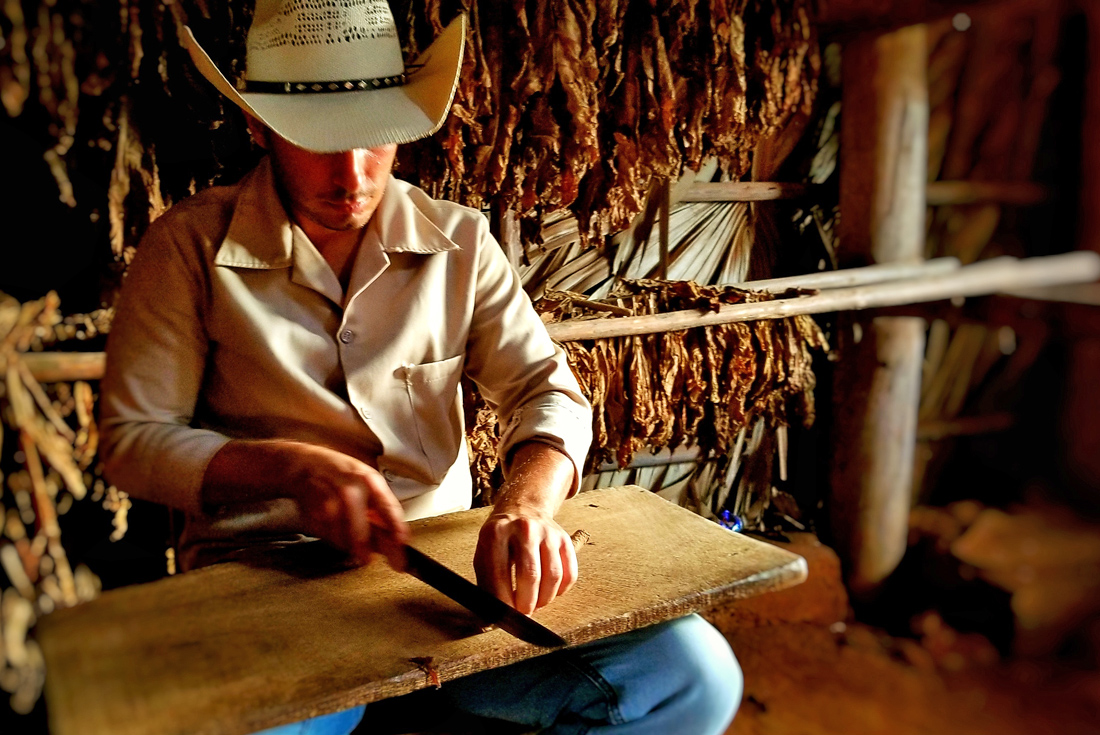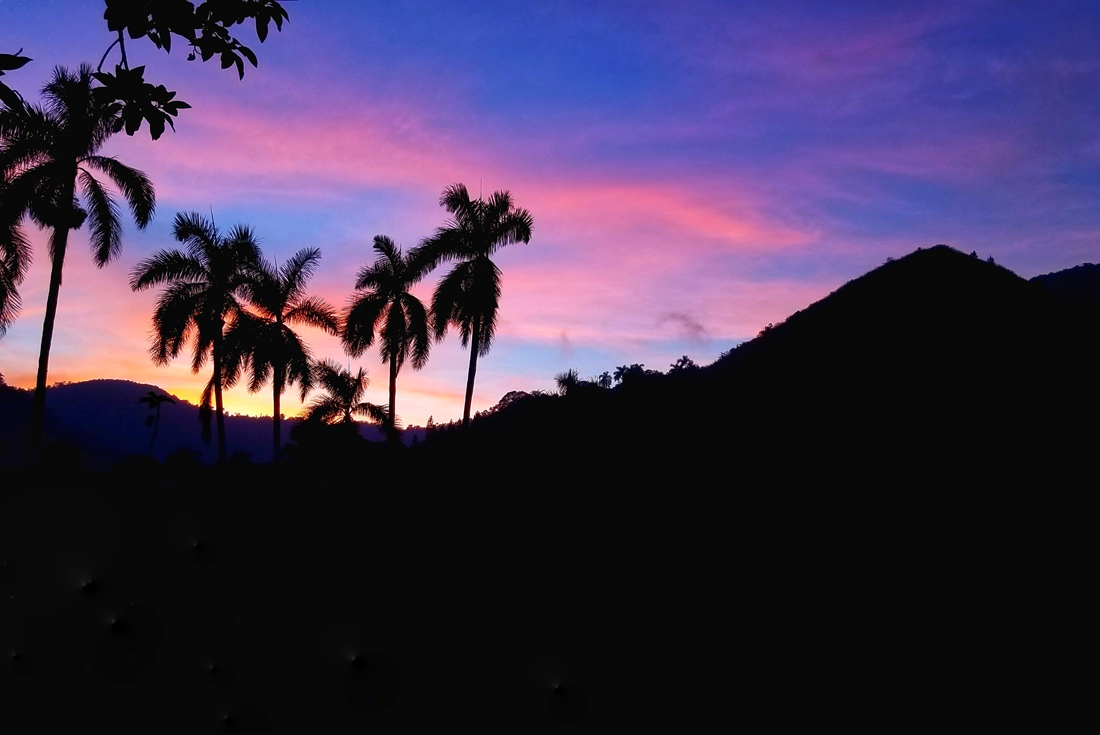- Cycling through Caribbean Cuba gives you unique access to parts of the island that are off the beaten track.
- Cycle through the lush valleys of Soroa and Yum i, one known as Cuba's Rainbow and rich in plant and wildlife, the other an untouched paradise far off the usual tourist track.
- Cuba is recognised as the world’s finest cigar manufacturer. Learn how to roll a cigar with a local tobacco farmer near the small town of Vinales.
- After a visit to the temporary HQ of Cueva de los Portales, a guided walking tour of Old Havana, and a visit to his final resting place in Santa Clara, you’ll understand Che Guevara's important role in the Cuban Revolution.
- Ride through an often surprising variety of scenery; from the decaying charm of Old Havana to long dusty farming roads to dramatic limestone karst landscapes. Cuba has it all!
04 Jul 2023
Cycle Cuba
QBXCC
Validity: 01 Jan 2023 to 31 Dec 2023
Experience Cuba from two wheels as you cycle around this laidback Caribbean island. Travel the colourful streets of Havana, the dusty roads past the farms and tobacco plantations of Vinales, cycle alongside vintage cars on your way to the verdant Bay of Pigs, discover UNESCO Word Heritage Sites of Cienfuegos and Trinidad and experience Cuba beyond the rum and cigar scene. Pay homage at Che Guevara’s final resting place in Santa Clara, cycle the pristine and untourised Yumuri Valley, and enjoy the perfect beaches of vibrant Varadero, Cayo Jutias’ clear blue waters and cool off in bubbling river pools near Las Terrazas. Soak up the best of Cuba as you traverse this fascinating country.
Original
Cycling
Bicycle,Support Vehicle (Bus)
3
PHYSICAL PREPARATION There are regular rest breaks each day, however it is important to note that you will be riding over multiple and consecutive days in a climate and terrain that may be unfamiliar. While it can be tempting to start out riding as hard and fast as you can (we get it!) we recommend taking it easy on the first few days while your body gets used to the rides and the climate. As a general rule, the more preparation you can do for this type of trip, the more you will enjoy it. Prepare for the trip by doing aerobic type exercises before travelling - jogging or swimming are some options, though cycling is best. If possible take some extended day rides before travelling, or spend time on exercise bikes in the gym. The more your muscles (and bottom) are prepared for the riding on this trip the more you will be able to enjoy the wonderful countryside and people you meet while riding. Note that an enthusiasm for bike riding and adventure is essential! It is also important that you are both confident and competent in riding a bicycle, both solo and in a group environment. CYCLING DISTANCES: The information listed in the itinerary is a guide to the approximate distances and terrain cycled each day. However, this may vary depending on the physical capabilities of the group, and changes to local conditions. For safety reasons we only cycle during daylight hours, so there may be some early morning starts. We take regular rest breaks throughout cycling days. In Cuba we ride relatively short distances, the shortest being 12kms and the longest 63kms. However the terrain is quite hilly and the Caribbean heat and humidity can have an effect, as can the poor state of the road in many places meaning the physical effort can sometimes be harder than expected.
Guesthouse
Central Havana
Havana
CUBA
Cuban guesthouses (known locally as casas) are similar in style to B&Bs, where families do not necessarily live in the residence. While some guesthouse managers and owners speak English, interaction mostly consists of gestures, smiles and ‘Spanglish’. Just like the residences in your own neighbourhood, each casa is unique; expect there to be differences between the rooms you and your travelling companions stay in. Generally, there will be 1-4 group members in each guesthouse. Each room has a private bathroom with towels, and some basic toiletries may be provided. Occasionally two rooms will share one bathroom. Power cuts do occur on occasion, meaning that hot water can’t always be guaranteed regardless of the guesthouse standard.
A complimentary airport arrival transfer is included; valid if you are arriving on Day 1 or if you have booked pre-tour accommodation through us. You must provide your flight details to your booking agent at least 14 days prior to travel. For your confirmed arrival transfer, you’ll be met outside your arrival terminal by a transfer representative holding an Intrepid sign. In case of flight cancellations, changes, if you experience severe delays at immigration, baggage collection or customs, or if you are not able to find the driver, please contact the transfer operator: +53 5333 8121 or +53 5438 9140. Our transport provider, ECOTUR, also have an office in Terminal 3 and you can approach them directly for assistance. LOCAL ASSISTANCE We have a desk located in the listed address below; providing a 24-hour service with English speaking employees if any assistance is required. La Gargola Guesthouse 1st floor #82 Cuba Street Old Havana (between Cuarteles & Chacon Streets) +53 (7) 8605493
Guesthouse
Central Havana
Havana
CUBA
Intrepid can assist with pre-booking a departure transfer to the airport - enquire with your agent. Please advise your flight details at least 14 days prior to the start of your trip. If you have a confirmed departure transfer you will be collected from your guesthouse 3.5 hours before your flight departure time. Your leader will confirm this with you the day before your departure. If your driver has not arrived within 15 minutes of the scheduled pick up time, or your departing flight is cancelled or changed, please contact the transfer operator directly: +53 5438 9140. A taxi from your hotel to the airport will take approximately 25mins, depending on the traffic, and cost approximately EUR30. Please ask your leader or guesthouse staff for assistance in arranging a taxi.
1. A complimentary airport arrival transfer is included; valid if you are arriving on Day 1 or if you have booked pre-tour accommodation through us. You must provide your flight details to your booking agent at least 14 days prior to travel. 2. A single supplement is available if you’d prefer not to share a room on this trip. The single supplement applies to all nights of your trip and is subject to availability. Please speak to your booking agent for further information. 3. Bicycle hire is included in your trip price. Please advise your height at time of booking so we can organise a suitably sized bike. 4. Bike helmets are compulsory on this trip. You are unable to purchase or hire bike helmets locally so please ensure you bring your own bike helmet from home. 5. On this trip we have a single leader that rides with the group, and another that drives the support vehicle (acting as a back marker where needed). 6. The laws around health and safety in Cuba are very different than in more developed countries, even for government licenced accommodation. While we endeavour to source accommodation that is compliant to our own health and safety standards there will be occasions where the accommodation will not have a marked fire exit, fire extinguishers or smoke alarms. Please ask your casa owner to explain the fire evacuation plan to you when you check in. 7. Hurricane season is June to November, when landslides, mudslides, flooding and disruptions to essential services can occur. Intrepid monitors these situations as they may arise, so that itineraries or activities can be amended as necessary. 8. The Cuban government has declared that from 1 May 2010, travel insurance (which covers at least medical expenses) to be compulsory for all travellers to Cuba. Proof of travel insurance will be requested at Havana airport by immigration officials. Travellers failing to produce a valid document will be required to purchase a new policy at the airport, before being granted access to Cuba. 9. Please advise bedding configuration requests to your booking agent at least 14 days prior to travel to aid guesthouse and rooming allocations, which are finalized 10 days prior to departure based on the configuration of each travelling party. You may request your confirmed guesthouse name and address inside 7 days of departure from your booking agent. Rest assured, the transfer driver will know the address of your assigned guesthouse.
All Intrepid cycling group trips are accompanied by one of our cycling leaders. The aim of the group leader is to take the hassle out of your travels and to help you have the best trip possible. Intrepid endeavours to provide the services of an experienced leader however, due to the seasonality of travel, rare situations may arise where your leader is new to a particular region or training other group leaders. Our cycling leaders are all passionate cyclists, as you’d expect, but they also go through some pretty rigorous cycle-trip specific training. Each one has undergone on-road training and supervision and knows how to do safety checks, basic repairs and emergency first-aid. And at the end of the day they’re still regular Intrepid leaders, which means they will provide information on the places you are travelling through, offer suggestions for things to do and see, recommend great local eating venues and introduce you to our local friends. While not being guides in the traditional sense you can expect them to have a broad general knowledge of the places visited on the trip, including historical, cultural, religious and social aspects. At Intrepid we aim to support local guides who have specialised knowledge of the regions we visit. If you were interested in delving deeper into the local culture at a specific site or location then your leader can recommend a local guide service in most of the main destinations of your trip.
We take safety seriously on all our trips, but cycling tours deserve a few special considerations. HELMETS: Helmets are compulsory and we do not allow anyone to ride without one (including our own staff!). You can bring your own, or purchase one that meets international safety standards on the ground. Your leader can assist with this. FOOTWEAR For safety reasons we strongly recommend that you wear shoes that cover the toes while riding. SUPPORT VEHICLES We usually have a support vehicle following us if first-aid is ever necessary or people are feeling too tired to ride. BIKES: Our bikes are serviced regularly, and we get them checked by experts before each and every trip. Should you choose to bring your own please note that while we are happy to assist where we can with repairs you are responsible for the safety and suitability of your own equipment. TRAFFIC AND DRIVING ON THE OTHER SIDE OF THE ROAD: Depending on where you come from please note that drivers in this part of the world may drive on the opposite side of the road from what you are used to. Look both ways before crossing any road. Traffic can be a little more chaotic than you might be used to at home. Be aware! There are times when traffic conditions make sections of our planned riding route unsafe – in this instance we will use the support vehicle. WEATHER Due to inclement weather posing a serious health or safety issue there may be times when we use the support vehicle instead of doing the planned ride. We will endeavour to reroute if possible but at times may have to cancel the planned ride.
Most national governments provide regularly updated foreign travel advice on safety issues involved with international travel. We recommend that you check your government's advice for their latest travel information before departure and ensure that your travel insurance covers you for all destinations and activities on your trip. Please refer to our website's safety page for links to major travel advisories and updates on safety issues affecting our trips here: https://www.intrepidtravel.com/travel-alerts We strongly recommend the use of a neck wallet or money belt while travelling, for the safe-keeping of your passport, flight tickets, cash and other valuable items. Leave your jewellery at home - you won't need it while travelling. Many of our hotels have safety deposit boxes, which is the most secure way of storing your valuables. A lock is recommended for securing your luggage. Your leader will accompany you on all included activities, however, during your trip you'll have some free time to pursue your own interests or relax and take it easy. While your leader will assist you with the available options in a given location, please note that any optional activities you undertake are not part of your Intrepid itinerary, and Intrepid makes no representations about the safety of the activity or the standard of the operators running them. Please use your own good judgement when selecting an activity in your free time. Please also note that your Leader has the authority to amend or cancel any part of the trip itinerary if it's deemed necessary due to safety concerns. Intrepid's operational safety policies can be viewed on our website at the link below. We recommend that you take a moment to read through this information before travelling, and would appreciate any feedback on how safety is being managed on our trips.
In this destination the traffic drives on the right-hand side of the road. Drivers are generally respectful and careful of cyclists but it is important to be aware at all times.
https://www.intrepidtravel.com/safety-guidelines
PETTY THEFT AND PERSONAL SAFETY While travelling there is always the risk of pick-pocketing and petty theft, particularly in the more touristy cities. We recommend that you exercise caution when walking alone at night and encourage you to walk together and only on main, well-lit thoroughfares. Be particularly vigilant on public transport. Simple measures like carrying your day pack on your front, not hanging your bag over the back of your chair or on the floor and wearing a money belt will reduce any chance that your valuables should go missing.
LOCAL LODGINGS: On this trip you will be staying in some restored houses and local lodges - these are one of the charms of this journey, but their staircases, balconies and passages etc may not always comply with western safety standards. Please do not expect elevators in these properties as they are preserved to their original state.
FIRE PRECAUTIONS: Please be aware that local laws governing tourism facilities in this region differ from those in your home country and not all the accommodation which we use has a fire exit, fire extinguishers or smoke alarms.
SEAT BELTS: Please be aware that local laws governing transportation safety may differ from those in your home country and not all the transport which we use is able to provide seat belts.
PASSPORT You’ll need a valid passport to travel internationally and most countries require your passport to have a minimum of 6 months validity, so remember to check the expiry date. We need your passport information to get everything ready for your trip so it’s important that the information on your booking matches your passport exactly. Please take care to provide the correct details. We recommend carrying a copy of the photo page of your passport while travelling and leaving a copy at home with family or friends. VISAS Many countries require a visa and obtaining the correct visa is your responsibility. We recommend you check your visa requirements as soon as you have booked your trip. This will ensure you have time to prepare your documents and for your visa application to be processed. Entry requirements can change and are different depending on your nationality. Please refer to your government's foreign travel advisories, the consular websites for the countries you’re travelling to and those you may transit through. Always follow visa advice from official websites; not all visa information found online may be valid. You can also head to Intrepid’s Entry & Health requirement page to get the latest information on travel documents and visa requirements, plus local government COVID-19 vaccination and quarantine policies: https://www.intrepidtravel.com/au/visa-health-requirements CUBA ENTRY REQUIREMENTS This trip is not for US passport holders. If you hold a US passport, we encourage you to book our Hola Cuba – for US Citizens trip. To view this trip you may need to change the website region at the bottom of the page if you are viewing our website from outside the US. Passport holders from Australia, Canada, and New Zealand are required to obtain a Tourist Card (Tarjeta de Turista) which is valid for 30 days from date of entry. You may be required to buy the card at your departure airport (eg YTO, MEX, CUN, SJO, LIM, PTY) at the check in counter or at the flight departure gate. Alternatively, you may need to buy the tourist card from your travel agency, but policies vary (eg Canadian airlines give out tourist cards during the flight), so you'll need to check ahead with your airline. In some cases, you can arrange a visa prior to departing your home country but this is usually more expensive and time consuming. If you are British or reside in Great Britain with a passport from the EU, Canada, Australia or New Zealand, you can apply for a Tourist Card here - https://www.cubavisas.com This type of Tourist Card is not valid for travel to Cuba from the USA, Puerto Rico or US Virgin Islands. You may use this local address to apply for your Tourist Card: Casa La Gargola, 1st floor #82 Cuba street, Old Havana. 48 hours before departing for Cuba, you will need to fill out the customs, immigration, and health declaration form on the D'Viajeros website. This generates a QR code that you will need for the airport check in process. https://www.dviajeros.mitrans.gob.cu/inicio To enter Cuba travellers are required to have evidence of sufficient funds for the duration of their stay, proof of travel medical insurance, as well as onward travel ticket. GETTING TO CUBA We recommend travelling to Cuba via Canada, Europe, South or Central America. If travelling via the US, you will require a US Tourist Visa after visiting Cuba – not an ESTA. Please refer to https://travel.state.gov/content/travel.html for more information. Travel to Cuba may also impact your eligibility for an ESTA in the future. Remember to check the entry requirements of all countries you will visit or transit through. PROHIBITED ITEMS WHEN TRAVELLING FROM CUBA TO THE US Travellers cannot bring alcohol or tobacco products from Cuba into the US for personal use. More information can be found here: https://help.cbp.gov/s/article/Article-82?language=en_US
Cycling through Caribbean Cuba gives you unique access to parts of the island that are off the beaten track.
Cycle through the lush valleys of Soroa and Yum i, one known as Cuba's Rainbow and rich in plant and wildlife, the other an untouched paradise far off the usual tourist track.
Cuba is recognised as the world’s finest cigar manufacturer. Learn how to roll a cigar with a local tobacco farmer near the small town of Vinales.
After a visit to the temporary HQ of Cueva de los Portales, a guided walking tour of Old Havana, and a visit to his final resting place in Santa Clara, you’ll understand Che Guevara's important role in the Cuban Revolution.
Ride through an often surprising variety of scenery; from the decaying charm of Old Havana to long dusty farming roads to dramatic limestone karst landscapes. Cuba has it all!
The guesthouses (casas) we use are much nicer than your average Cuban dwelling and each room is unique. Regardless of where you stay, power cuts and breaks in hot water supply are sometimes unavoidable, as in any developing country – but we believe that this is all a part of the local experience. To help set your expectations correctly, please read the ‘Accommodation’ section of the Essential Trip Information. To complete this trip it is important that you are both confident and competent in riding a bicycle. On this trip we have a single leader that rides with the group, and another that drives the support vehicle (acting as a back marker where needed) This is a cycling trip, so it requires a certain amount of cycling fitness. This being said, there’s always a comfortable, air-conditioned support vehicle following close by. Part of Cuba’s appeal is its old-fashioned style – this includes the banking systems. Funds in Cuba can be difficult to access. Please read our Essential Trip Information to be fully prepared The Caribbean climate can be very hot and humid. It's important to wear the appropriate clothing, drink plenty of water and apply sun protection regularly. Lycra cycling shorts are ideal for warmer temperatures. Internet access can be hard to come by, and when it's available it's sometimes unreliable. This is, on the other hand, a great opportunity to take a break from modern devices and have a true holiday. Cuba's roads aren't always paved, but when they are they can range from smooth to downright terrible. That being said, it’s a fun experience to share the road with tractors, vintage American cars and horse-drawn carriages. While Cuban food can sometimes seem limited due to a ban on imported goods, your guide will steer you towards the best eateries in each destination you visit. Cuba is different and that’s what makes it such a fascinating destination. You will find that things don’t always go according to plan or work the way they do back home. Regulations concerning foreigners and currency may appear strange to you, transport sometimes runs late and sometimes the water in your bathroom can run cold and the electricity fail. In order to get the most out of your holiday, a degree of patience, good humour and understanding is a definite advantage. Cuba may not be wealthy in a monetary sense, however if you approach your holiday with an open and enquiring mind, the warm welcome you receive from Cubans will ensure you a rich and rewarding holiday experience. Import restrictions make the purchase of new bicycles a difficult challenge - our bikes come from a variety of different manufacturers but are all mechanically sound.
GENERAL HEALTH All travellers need to be in good physical health in order to participate fully on this trip. When selecting your trip please make sure you have read through the itinerary carefully and assess your ability to manage and enjoy our style of travel. Please note that if in the opinion of our group leader or local guide any traveller is unable to complete the itinerary without undue risk to themselves and/or the rest of the group, we reserve the right to exclude them from all or part of a trip without refund. You should consult your doctor for up-to-date medical travel information or for any necessary vaccinations before departure. We recommend that you carry a first aid kit as well as any personal medical requirements in their original packaging as they may not easily be obtained while travelling. COVID-19 The safety and wellbeing of our travellers, leaders, crew, staff, and suppliers continues to remain our highest priority as we travel. You can read more about how we will keep you safe on our trips, including our COVID-19 Health & Safety Guidelines here: https://www.intrepidtravel.com/safe-travels VACCINATION POLICY From 1 January 2023, Intrepid will no longer require travellers to provide proof of vaccination against COVID-19 for this trip. However, we continue to strongly recommend that all travellers get vaccinated to protect themselves and others. Specific proof of testing or vaccination may still be required by your destination or airline. Please ensure you check travel and entry requirements carefully. For more information, including a detailed FAQ about this policy, please visit https://www.intrepidtravel.com/covid19. HEALTH SCREENING If you are unwell prior to travelling, please stay at home and contact us to make alternative arrangements. From 1 January 2023, Intrepid will no longer require travellers to complete a self-screening health form at the group meeting for this trip. If you are displaying any COVID-19 symptoms or have any health concerns during the trip, we will follow the advice of local health authorities to determine whether medical assistance, isolation or further action is required. Travellers who test positive while taking part in an Intrepid trip will need to leave the group for a minimum of five days and may only rejoin the group if presenting as asymptomatic – our team will assist them in arranging a place to self-isolate and any onward journey. It's quite possible that the destination country may have different or more strict protocols than your home country regarding COVID-19. This may include hotel or hospital quarantine or quarantine for the group. Please check your government's travel advice or contact the closest embassies to find out the details. We ask all travellers to continue to monitor their health throughout their travels and report any relevant symptoms to their tour leader. MOSQUITO-BORNE ILLNESSES: Some regions of Central & South America can experience outbreaks of dengue fever. There is no vaccination against it, but there are preventative measures that you can take such as wearing long clothing, using repellent, and being indoors particularly around dusk and dawn. If you have a fever or feel unwell, please let your leader know right away. Protect yourself against mosquito-borne illnesses such as malaria by taking measures to avoid insect bites. ZIKA VIRUS: There have been reports of transmission of the mosquito-borne Zika virus in this region and we advise all travellers to protect themselves from mosquito bites. Given possible transmission of the disease to unborn babies, and taking a very cautious approach, we recommend all women who are pregnant or trying to get pregnant to consult with their doctors before booking their trip. CYCLING HEALTH Riding across unfamiliar terrain in weather conditions that you are not used to can potentially lead to cycling-related health issues. By far the most common issue is that of dehydration. While this is most common on warm/hot days, it is also a factor during cold weather as you continue to sweat. Research shows most riders will typically lose 500-1000 ml of water per hour. While we schedule in frequent rest stops and encourage you to refill water bottles at every opportunity, it is the responsibility of each cyclist to monitor their own levels of hydration while cycling. The key point to remember is not to wait until you’re thirsty but to drink small amounts regularly from the start of your ride. Adding an electrolyte solution can aid in replenishing the salts/electrolytes lost through physical activity. This is especially important on days when you are drinking a lot of the bike.
To give you the maximum flexibility in deciding where, what and with whom to eat, generally not all meals are included in the trip price. This also gives you more budgeting flexibility. Our groups tend to eat dinner together to enable you to taste a larger variety of dishes and enjoy each other's company. There's no obligation to do this though. Your group leader will also be able to suggest restaurants to try during your trip. DIETARY REQUIREMENTS More restrictive diet requirements (vegans, celiac, gluten intolerance, fructose intolerance, lactose intolerance, etc.) can be accommodated along this trip but you should expect a lesser variety than what you can expect at home. We recommend bringing your own supply of snacks with you. Vegetarians should be aware that while you can get vegetarian meals in Cuba, you generally won't find much variety and you may get tired of being offered the same every day (i.e. - rice, beans, omelette and salad). Vegetarians are often surprised that their meals are no cheaper than those containing meat, and this is because vegetables on the free market in Cuba are of similar prices to those of meat. Please let us know your diet requirements before your trip starts. FOOD IN CUBA: Food in Cuba has a reputation for being bland and lacking variety, however it has improved dramatically over the last two years. There are very limited snacks available in Cuba; convenience stores exist but are certainly not as prevalent nor sell the quantity or variety of snacks or junk food you may be used to at home. You may wish to bring your favourite chocolates, candy or healthy snacks like muesli bars. Beans and rice are the staples, with cucumber, tomato and cabbage being the conventional ingredients for a Cuban salad. Chicken and pork are the most common meats served in Cuba, however fish and a variety of seafood is also frequently on offer. Please be aware that it is a cultural trait to serve meals larger than you are expected to finish, but be assured nothing will go to waste. It can be hard to find a suitable place to eat while travelling in Cuba, as roadside restaurants tend to cater for large tour groups and either offer a fixed meal or a very limited selection of snacks. In the cities and towns small privately-owned restaurants, paladares, offer a little more choice but can often only seat a maximum of twelve people (the number for which they are officially licensed). SNACK KITTY: During the group meeting, your trip leader will ask you if you would like to contribute to the snack kitty. This is usually EUR40 per person. The snack kitty is spent on water, fruits, and local-made snacks. It is not a compulsory kitty, although as these can sometimes be hard to come by in Cuba in remote areas, the kitty is designed to make the purchasing of snacks easier and more convenient for you. The left over funds will be returned at trip end. You can find out more information from your leader upon arrival.
CUBA Currency The official currency of Cuba is the National Peso (CUP, also known as Moneda Nacional M.N.). This is the only official currency currently used in Cuba. Cuban law states that it is illegal to remove any bills from Cuba so ensure that you use as much of your CUP cash as possible before departing the country. Euros (EUR) and USD are now widely accepted as payment in Cuba. However, the exchange rates vary significantly between banks and what is charged in private businesses. We recommended you bring cash in EUR/USD to pay for most services and do not exchange any money into CUP until you have met with your tour leader. They can advise where and when to exchange to get the best rate. CADECAs are the official government exchange houses that can be found in most cities and large hotels, but they are unreliable and offer unfavourable exchange rates. For this reason, we advise you exchange money upon the advice of your leader. Other than EUR/USD, you may also bring GBP or CAD that you can exchange while in Cuba. It might be possible to pay for some services directly in GBP or CAD, but the value and exchange rate can’t be guaranteed so it’s best to exchange for EUR/USD prior to leaving your home country. There are often changes to the regulations around foreign currency in Cuba. As such, we recommend reviewing this information again, closer to your date of departure. ACCESSING FUNDS IN CUBA We recommend you bring enough cash to last your whole time in Cuba. This is currently the best option and will provide you with the best value for money. We advise against relying on ATMs to withdraw money in Cuba, as ATMs often don’t work for foreign bank cards. There is also a 3% fee charged on cash withdrawals from ATMs. Cards issued by US banks or banks affiliated with US banks are not accepted in Cuba at all; among others, this includes Travelex, Westpac and Citibank. Contact your bank prior to travel about using your bank card in Cuba. You should still bring your debit/credit cards as you may need them for covering medical emergencies requiring large payment, at which time it may be possible to use them, but do not rely on them for day-to-day expenses. SPENDING MONEY When it comes to spending money on the trip, every traveller is a little different. You know your spending habits better than we do, so please budget an appropriate amount for things like optional meals, drinks, shopping, optional activities, and laundry. Make sure you have read the itinerary and inclusions thoroughly so you know what is included in the trip price and what you may need to pay for while travelling. BUDGET FOR MEALS NOT INCLUDED: Please budget for additional meals and expenses while on your trip. Our suggestion is based on past traveller feedback but you may choose to spend more or less. BUDGET FOR MEALS NOT INCLUDED: EUR 300 TIPPING If you're happy with the service you receive, providing a tip - though not compulsory - is appropriate. While it may not be customary to you, it's of great significance to the people who will take care of you during your travels, inspires excellent service, and is an entrenched feature of the tourism industry across many destinations. Due to the low government-set wages in Cuba, tipping is relied upon heavily so expect to tip for just about everything. We recommend that any tips are given directly to the intended recipient by a member of your group, rather than collected and passed on by the group leader. Hold on to your smaller notes and coins to make tipping easier. You can expect to tip restaurants, guesthouses, toilet attendants, local guides and drivers. Your leader will be able to advise on this. You may also consider tipping your tour leader for outstanding service throughout your trip. The amount is entirely a personal preference; however as a guideline EUR 2-4 per person, per day can be used. Of course you are free to tip more or less as you see fit, depending on your perception of service quality and the length of your trip. Remember, a tip is not compulsory and should only be given when you receive excellent service. In total, we recommend you budget approx. EUR10 to 15 per day of your trip to cover tipping. CONTINGENCY FUNDS We try to plan for every eventuality, but there are still some things beyond our control. We reserve the right to change an itinerary after departure due to local circumstances or a Force Majeure Event. In such emergency circumstances, the additional cost of any necessary itinerary alterations will be covered by you. Please note we are not responsible for any incidental expenses that may be incurred as a result of the change of itineraries including but not limited to visas, vaccinations or non-refundable flights. Make sure you have access to an extra US$500 for emergencies (e.g. severe weather, natural disasters, civil unrest) or other events that result in unavoidable changes to the itinerary (e.g. transport strikes or cancellations, airport closures). Sometimes these things necessitate last-minute changes to enable our trips to continue to run, and as a result, there may be some extra costs involved. The recommended amount is listed in USD for the relatability of universal travellers, however, local currency may be needed once in the country to cover these costs.
Packing for a cycling tour isn’t that different from any other adventure. But if you want to be comfortable and warm, here are a few bike-specific tips. • Helmet – these are compulsory, but if you don’t have your own you can sometimes purchase an approved and well-fitted one at the start of the trip (our leaders can assist you with this). There are some destinations where you are unable to purchase or hire appropriate helmets locally so you will need to bring your own - please check the 'Important Notes' section to see if this is the case. • Padded bike shorts • Quick-dry jerseys – you can definitely get away with a few cotton t-shirts but having a few light and breathable jerseys will make your cycling a lot more comfortable, especially in warmer/humid climates. • Quick-dry socks • Cycling gloves – not essential but recommended as padded cycle gloves will make your riding more comfortable and can help protect you in case of a fall. • Rain gear – pack a light poncho in case the weather turns when you’re out on the road • Light breathable waterproof/windproof – especially useful for those early mornings or downhill sections when the wind-chill becomes a factor. • Water bottle – we don't provide bottles but all our bikes have one bottle holder fitted (and a second one can be fitted if required). Please bring a cycling-specific water bottle as other types will fall out of the holders. A Camelbak will make drinking on-the-go easier. • Sunglasses – well fitted sports sunglasses help protect against dust, insects and (of course) the sun • Day pack – our support vehicle will carry your main bag, but a day pack for snacks and clothes is a good idea. • Suncream – please bring a high protection factor (e.g. SPF 50) sunscreen as long days in the saddle can really expose you to the sun • Shoes – normal sports shoes can be worn on all of our trips however you may want to consider a flat shoe with a relatively stiff sole as it makes pedalling a lot more efficient. Regular cyclists are welcome to bring their own cycling-specific shoes however we recommended 'mountain bike' style shoes that have grip on the sole rather than road bike' shoes as you will still be walking around while on the rides (cafe/photo/toilet stops, etc.). For safety reasons we require that you wear shoes that completely cover the toes while riding. • Saddles – are saddles are standard, unisex models –less experienced cyclists may choose to bring your own gel seat cover for added comfort. Regular cyclists are welcome to bring your own saddle – our leader will assist in fitting it to your bike • Pedals – all bikes come with flat pedals. Regular cyclists are welcome to bring their own pedals – our leader will assist in fitting them to your bike As space in our support vehicle/transport can be limited we request that you bring only a small luggage bag with you rather than larger bags or suitcases.
Please note that suitable quality bicycle helmets are extremely difficult to purchase or hire locally in Cuba so it is important to bring your own from home.
Please note that stand alone GPS units (such as a Garmin) are a restricted item requiring pre-authorisation to bring into Cuba. To avoid the risk of having it confiscated on arrival we recommend not bringing such devices with you on this trip.
What you need to bring will vary according to the trip style you have chosen, the countries you are visiting and when you are travelling. Generally speaking, we recommend you pack as lightly as possible and make sure that you are able to carry and lift your own luggage, and walk with it for short distances or up or down a flight of stairs. Our travellers usually find the smaller their luggage is, the more they enjoy the trip not having to worry about carrying heavy bags! Aim to keep your main luggage under 15kg. Many travellers carry their luggage in a compact smaller suitcase or backpack with wheels. We recommend your bag has carry straps or handles so it is easy to lift and carry for the times you are unable to wheel it (ie. on rough surfaces or up steps). If you are taking overnight trains, or primarily using public transport then the smaller your luggage the easier it will be to store under or above bunks. Large suitcases may not be able to be taken on board. A lockable bag or small padlock for your bag will be useful especially when travelling on public transportation as well. You'll also need a day pack/bag to carry water, camera, swimming suit, hiking shoes and jacket etc. when you’re exploring during the day. Below we have listed the essentials for this trip:
https://www.intrepidtravel.com/packing-list
BRINGING YOUR OWN BIKE If you would like to bring your own bike please see the 'Transport' section of your Essential Trip Information.
Most travellers prefer to take a small to medium wheeled suitcase, which is a great size for the packing capacity in our private vehicles. Whatever you take, be mindful that you will need to be able to carry your own luggage, handle it at airports, take in/out of accommodation and perhaps even walk short distances. Generally speaking, we recommend you pack as lightly as possible. You'll also need a day pack/bag for activities and day trips. Other than the items and clothing you always need on a trip, below we have listed packing suggestions specific for this trip: ESSENTIAL: - Warm as well as light clothing. Central America is often assumed to have hot weather, but it can get cold in the countryside, mountains and at night in the winter so we suggest you check the expected temperatures en route and bring clothing that you can layer - Closed-in shoes will help to protect your feet from cuts and scratches when walking through cities as well as bush/grass-lands, and will also act as a barrier protection in rare cases against bites or stings - Sun protection - hat, sunscreen, sunglasses - Water bottle. We recommend at least a 1.5 litre capacity. The sale of bottled water contributes to an enormous environmental problem around the world. In addition to the water in bottles, the production of a 1 litre plastic bottle takes 2 litres of water and 200ml of oil. A large proportion end up in limited landfill or discarded in waterways and natural environments RECOMMENDED: - Soft and/or hard copies of all important documents e.g. air tickets, passport, vaccination certificate, travel insurance etc. and keep the hard copies separate from the originals. While not valid, a copy makes it very much easier to obtain replacements if necessary - Reusable straw - Electrical adapter plug (view www.kropla.com) - Personal medical kit. Your guide will carry a large kit but we recommend you carry items such as mild pain killers, electrolytes and Band-Aids - Insect repellent - Watch/Alarm clock or phone that can be used for both - Swimwear - Travel beach towel - Tissues &/or toilet paper &/or wet wipes - Insect repellent - Toiletries. We recommend you to take your own supply of shampoo, soap and toilet paper to use in the guesthouses and public toilets. We also encourage women to take their own supply of sanitary items as these items are not widely available for purchase in Cuba - Despite their low income levels, Cubans love to dress up smartly and fashionably whenever they can. For going out in the evenings, casual dress is acceptable everywhere although one collared shirt for males is recommended, otherwise there's no need to bring clothes or footwear especially for this OPTIONAL: - Ear plugs to guard against a potential snoring room-mate - Phrase book VALUABLES: Please try to avoid bringing unnecessary valuables, and use your safe if available. It’s also a good idea to purchase a money belt or pouch that is easily hidden. LAUNDRY: A laundry service is offered at some hotels used on this trip, or in some guesthouses if you’re travelling in Cuba. You might need to wait for a two-night stop to make sure you get it back in time. While laundry at hotels is usually charged by the item, laundromats which are also an option, usually charge by the kilo, which is generally inexpensive (approximately USD$5 per kilo). GIFTS: Given the difficulty of securing basic goods in Cuba, surplus items that you have at home such as soap, shampoo, perfumes, sewing kits, toothbrushes and pens or pencils are warmly accepted. We do encourage you to discuss gift giving with your leader so that items can be distributed to organisations in need. If you decide to hand out gifts without the leader’s guidance, we suggest you distribute as a sign of appreciation after a genuine interaction, whether that be a conversation or offered help, rather than a means to create engagement. Please always refrain from handing items directly to children. It is not necessary to bring gifts for the guesthouse owners in Cuba; these are not a homestay experience and as they are a business they are most-likely run by some of the more well-off families who will be happy enough with just your good-natured presence.
Please note that Hurricane season is June to October, when landslides, mudslides, flooding and disruptions to essential services can occur. Intrepid monitors these situations as they may arise, so that itineraries or activities can be amended as necessary.
While we do accept children under 18 on this trip we do have a couple of rules. From a safety and enjoyment perspective they should be confident and competent cyclists capable of completing the riding part of the itinerary without additional assistance. Minors under 18 years old must always be accompanied by a parent/legal guardian. This includes when the minor rides in the support vehicle. We like to think our Intrepid travellers are all connected by a love of adventure and passion for seeing the world in a different way. We've laid down a few non-negotiable rules to ensure everyone feels connected, comfortable and safe on our trips. We ask that you respect your fellow travellers, group leader, and local people and places we visit in all circumstances. We don't tolerate any forms of violence and expect that you follow the local laws, customs and regulations in any destination we travel to. Any behaviour contrary to the above, including any behaviour that prevents our staff from performing their duty of care or continuing the itinerary as planned, may result in travellers being removed from the trip. If you consume alcohol while travelling, we encourage responsible drinking and expect you to abide by local alcohol laws. To ensure the well-being of everyone on the trip, all decisions made by group leaders and ground staff are final. Romantic relationships between travellers and group leaders are not permitted while on trip. By travelling with us, you agree to comply with these rules and the laws and customs of all countries visited. If something is concerning you during your travels with us, please speak to your group leader or local guide immediately. Alternatively, contact us on the emergency contact number detailed in your Essential Trip Information’s Problems and Emergency Contact section.
After your travels, we want to hear from you! We rely on your feedback. We read it carefully. Feedback helps us understand what we are doing well and what we could be doing better. It allows us to make improvements for future travellers. http://www.intrepidtravel.com/feedback/
While we always endeavour to provide the best possible holiday experience, due to the nature of travel and the areas we visit sometimes things can and do go wrong. Should any issue occur while you are on your trip, it is imperative that you discuss this with your group leader or our local representative straight away so that they can do their best to rectify the problem and save any potential negative impact on the rest of your trip. We recognise that there may be times when your group leader/local partner may not be able to resolve a situation to your satisfaction - if this is the case, please ask the leader to speak to their direct manager. You may also choose to provide details in your online feedback, which we ask you to complete within 30 days of the end of your trip. Please do be aware that it is very difficult for us to provide any practical help after the trip is completed, so informing us while still travelling will give us the opportunity to resolve the issue in real-time. For general contact details please use the following page: http://www.intrepidtravel.com/ourtrips/contact/ In case of a genuine crisis or emergency, you can reach our local office on the number below: Intrepid's Local Operator (located in Havana): +53 5333 8121 or +53 5438 9140. In Cuba, if necessary, you may use *99 prior to dialling to make a reverse charge call. If you cannot reach the operator using the above numbers, alternatively you may try our Cuba representative located in Australia +61 430 504 636. Communication lines in Cuba are unreliable and establishing a clear line requires patience. Please follow these instructions to ensure our operators can assist you in times of need. Since voicemail isn't an option and most incoming call phone numbers are automatically blocked, our operator will not be able to return any missed calls. The only solution to this problem is persistence. Keep calling the line until an operator answers the call. Alternatively, the emergency line is a mobile number that can be reached via text. If you cannot establish a connection to our operators over the phone, please send a text with your full name, any booking numbers (if known), the issue at hand and a return contact number. You will most likely receive a response via text.
Our Responsible Travel Policy outlines our commitment to preserving the environment, supporting local communities, protecting the vulnerable, and giving back to the places we travel. All our trip leaders, suppliers, and staff are trained on these principles and are core to us delivering sustainable, experience-rich travel. Explore the different parts of our Responsible Travel Policy by visiting: https://www.intrepidtravel.com/responsible-travel http://www.intrepidtravel.com/ourtrips/rt/responsibletraveller
We created our not-for-profit, the Intrepid Foundation because you – our travellers – told us you wanted to make an even greater impact in the communities you visit. The Foundation works by teaming up with partners around the world so that together we can deliver greater positive impact at scale. Partners are identified by our local staff who live and work in our destinations. They harness their powerful community connections to determine the issues that matter most and select local partners who can deliver real solutions. Since 2002, the Intrepid Foundation has raised more than 12.8 million dollars and supported more than 130 communities worldwide. Now, with almost 40 partners all over the world, your donations are helping to restore forests in Kenya, empower women in Honduras and promote elephant welfare in Laos, to name just a few. By simply being on this trip, Intrepid Travel will make a donation to the Intrepid Foundation on your behalf. If you choose to donate too, 100% of your donations will go directly to our partners on the ground – where they’re needed most. For more information about the Intrepid Foundation, please ask your leader or visit our website: http://www.theintrepidfoundation.org/ This trip directly supports World Bicycle Relief, who are providing people in low-income communities with bicycles to mobilise school kids, health workers, and farmers in far-out areas - giving them access to education, healthcare, and income. Donations help provide Buffalo Bicycles to those who need them most. To find out more or make a donation, visit: www.theintrepidfoundation.org/t/wbr
CUBA GUESTHOUSES We have classified guesthouse rooms into three standards for the comfort levels of our trips: standard, comfortable and premium. Most differences can be a little hard to tell at first, particularly when taking aesthetic into account which varies greatly not only between rooms but also between cities and provinces. Be assured though that the comforts to which foreign travellers are accustomed have been taken into account when classifying guesthouses. You can read more about the guesthouse we use here: https://www.intrepidtravel.com/adventures/cuba-casa-particular/ Stairs are prevalent in Cuban homes. If this presents a problem to you, then please advise us at time of booking so we can request rooms on or closer to ground level. For this itinerary, the standard guesthouse rooms will have an ensuite and air-conditioning however will not necessarily have a split system, an in-room or in-house safe or imported bedding. PRE-TOUR ACCOMMODATION We aim to confirm the first night of your tour in Old Havana however occasionally due to availability we will confirm it in either Central Havana or Vedado. If you book pre-tour accommodation through us we will also aim to book these nights in Old Havana. Late requests and requests of 3 nights or more have a lower chance of being confirmed in Old Havana. POST-TOUR ACCOMMODATION The final night of your tour may be booked in either Vedado, Central Havana or Old Havana. If you book post-tour accommodation through us, we aim to confirm it at the same property (regardless of the area we have secured) to avoid the inconvenience of you having to move. If you specifically prefer your post accommodation to be booked in Old Havana you must inform your booking agent and we will request this. You will need to make your own way between the final guesthouse and your post-tour guesthouse. Late requests and requests of 3 nights or more have a lower chance of being confirmed in Old Havana. The style of accommodation indicated in the day-to-day itinerary is a guideline only and may change. On some occasions, alternative arrangements may need to be made due to the lack of availability of rooms in our preferred accommodation. In these cases, we will use a similar standard of accommodation. Throughout the trip, we request that our properties prepare rooms in time for our arrival, especially if we're arriving prior to normal check-in time. However, this isn't always possible which means we won't be able to check-in immediately on arrival at some hotels. Instead, we can store our luggage and explore our new destination or on some trips, have use of shared day rooms until all rooms are available.
While there are occasions we use local public transport such as trains, buses or taxis to cover long distances or attend non-cycling activities we predominantly use the bicycle as our main form of transport. On most of our trips we also have a support vehicle as secondary transport for travelling longer distances, avoiding hazardous areas to cycle, as a backup should we have any incidents and of course an option for those that would prefer not to cycle for an hour or a day. These vehicles range from a minivan in most regions up to a full sized coach or overland vehicle in others. Your main luggage is transported in the support vehicle BICYCLES USED ON THIS TRIP Due to heavy import restrictions we do not have a consistent fleet of bicycles in Cuba, and use a variety of different makes and models (including Giant, Specialized, Scott, Bergamont, Trek and Raleigh). While the bikes are not new they come in a variety of sizes, are in sound mechanical order and suitable for the type of riding we do in Cuba. BRINGING YOUR OWN BIKE INTO CUBA If you would prefer to bring your own bike into Cuba, that is fine. However, please bear in mind that the bike will need to be in perfect working order with no worn parts. This is because spare parts are almost impossible to source in Cuba. You may also be required to complete paperwork both on arrival and on departure to prove to airport authorities that the bike has left Cuban soil. BRINGING YOUR OWN BIKE If you are planning to bring your own bike please note we strongly recommend against bringing a road bike. The often poor condition of the roads in Cuba (broken tarmac, gravel and frequent potholes) require front suspension, so a mountain bike or hybrid (with suspension) is recommended. Quality spare bike parts are extremely hard to come by in Cuba so please bring any you feel you may require. Arriving with oversize luggage. Havana’s Jose Marti airport has oversize luggage delivery at both ends of the baggage terminal. Oversize items (such as bicycles) can come out of either - regardless of where your main luggage came out - and can take up to 2hrs if multiple flights are arriving around the same time. BICYCLE RENTAL HAVANA If you arrive early and wish to hire a bicycle there are a number of reputable bicycle hire companies. We recommend RUTA Bikes, located in the Vedado region of Havana. Rates vary by the type of bike but we'd recommend either a mountain bike or touring bike option due to the large number of potholes on Havana's streets. For further info (including location & current prices) see their website at http://www.rutabikes.com/rent-a-bicycle/ or to hire a bike email [email protected] directly. NAVIGATING YOUR WAY WITHOUT THE INTERNET To make it easier to find your way around (especially in the main cities) we recommend downloading offline maps (such as Google maps) to your mobile device/phone – that way you can use live GPS mapping while your mobile device is in ‘Flight Mode’, saving battery and internet time. BRINGING YOUR OWN BIKE While we’re confident in the quality and suitability of the bikes we include, we do recognise that sometimes you just need the comfort of your own bike to enjoy the ride. If you are thinking of bringing your own bike on this trip, please advise us at time of booking and take note of the below information. If you do choose to bring your own bike, please note that we will not being carrying a spare bike for you. SUITABLE TYPE OF BIKE Although the surfaces of the roads we travel on are generally good there are occasionally gravel or potholed sections of road/track. As such, we recommend a 'mountain' or 'hybrid' style bike with plenty of gear selections for easy cruising. For more details on the type of roads we’ll be riding on see the ‘Physical Rating’ section of your Essential Trip Information. Please contact your booking agent if you have any questions about the suitability of your bike. We usually cannot accept tandem bikes on our trips as they are often too large for our transport. In some destinations we can make an exception. Please ask your booking agent if you are interested in bringing a tandem bike. BEFORE THE TRIP We recommend that you have a full service of your bike performed by a trained mechanic to help minimise any issues you may have during the trip. Please also ensure that you have specific and adequate cover for loss, damage or theft for your bike under your travel, home and contents or specialist insurance policy. DURING THE TRIP Your bike will be transported in the same way as our included bikes, usually in the support vehicle or on the bike trailer. While we endeavour to take the best care we can, you should recognise that transported bikes do get the occasional bump or scratch along the way. The same applies when we take other forms of transport, such as a train, where we are unable to pack the bikes ourselves. Your bike will be secured in the same way as our included bikes. This can occasionally be outside the vehicle (where the bikes are locked together). In order to reach our destination, it is necessary for us to travel via various modes of transportation, including planes and trains. Any extra costs involved with transporting personal bikes are your responsibility. This includes (but is not limited to) additional transport costs and customs/import fees. While our mechanics can usually assist with minor repairs, you are responsible for the safety and upkeep of your own bicycle. This includes conducting regular safety checks of your bike during the trip and cleaning your bike. In addition, any parts that require replacing are your responsibility. Most destinations have access to only limited spares along the way and access to bike shops can be days apart. Therefore, please ensure you bring any spare parts that you may require (especially specialist parts). TRANSPORTING YOUR BIKE TO/FROM THE DESTINATION Your preferred airline should have no problem carrying your bike, but many will charge an extra fee. Contact them before departing to discuss their arrangements for transporting bikes. A well-padded bike box (obtainable from a bike shop) is usually the best method of plane transportation. We recommend that you accompany your bicycle on the flight. Unaccompanied bicycles have been known to spend some extra days in the hands of customs authorities. Many taxis are not large enough to transport a bike box/bag so you may be delayed waiting for a suitably sized vehicle. INCLUDED OR HIRE BIKES: CONDITIONS OF USE You must not mistreat the bicycle and must return it in the same condition as when you received it (excepting ordinary wear and tear). You should immediately inform the supplier in the case of breakdown or loss. The provider is entitled to charge for any damage caused to the bicycle during the period of hire. You must also make sure that the bicycle is secured when not in use. If the equipment is lost or stolen you may be liable for the replacement value of the bicycle. The bicycle remains the property of the supplier and you may not sell, rent out or part possession with the bicycle. You must not use the bicycle while under the influence of alcohol or drugs. INCLUDED OR HIRE BIKES: CONDITIONS OF USE You must not mistreat the bicycle and must return it in the same condition as when you received it (excepting ordinary wear and tear). You should immediately inform the supplier in the case of breakdown or loss. The provider is entitled to charge for any damage caused to the bicycle during the period of hire. You must also make sure that the bicycle is secured when not in use. If the equipment is lost or stolen you may be liable for the replacement value of the bicycle. The bicycle remains the property of the supplier and you may not sell, rent out or part possession with the bicycle. You must not use the bicycle while under the influence of alcohol or drugs.
Travel insurance is compulsory on all our trips for those travelling internationally. We require that at a minimum you are covered for medical expenses including emergency repatriation. If you are travelling within your home country or region please confirm before travel that you are entitled to access the public medical system easily should an accident occur. We strongly recommend all travellers have a policy that also covers personal liability, cancellation, curtailment and loss of luggage or personal effects. For international trips, you will not be permitted to join the group until evidence of travel insurance and the insurance company's 24-hour emergency contact number has been sighted by your leader. If you have credit card insurance your group leader will require details of the participating insurer/underwriter, the level of coverage, policy number, and emergency contact number rather than the bank's name and your credit card details. Please contact your bank for these details prior to arriving in-country. For travellers who reside within the European Union, Switzerland or USA the requirement to purchase travel insurance cannot be compulsory. However the purchase of travel insurance is still highly recommended, and travellers from these regions who decline travel insurance when travelling outside of their home region must sign a Travel Insurance Waiver Form at the Group Meeting, recognizing personal responsibility for emergency medical and repatriation costs should they arise. For assistance with travel insurance or other services, please visit the link below: https://www.intrepidtravel.com/booking-resources/our-services TRAVEL INSURANCE: The Cuban government has declared that travel insurance (which covers at least medical expenses) is compulsory for all travellers to Cuba. Proof of travel insurance may be requested at Havana airport by immigration officials. Travellers failing to produce a valid document will be required to purchase a new policy at the airport, before being granted access to Cuba. Cuban authorities also announced that they will not recognise any insurance policy issued or underwritten by any insurance company which has an affiliation with a US company. You should take this into account when purchasing your insurance before departure from your home country.
As you travel on a group trip you will be exposed to all the pleasures and maybe some of the frustrations of travelling in a group. Your fellow travellers will probably come from all corners of the world and likely a range of age groups too. We ask you to be understanding of the various needs and preferences of your group - patience with your fellow travellers is sometimes required for the benefit of everyone's travel experience. Remember too that you have responsibilities to the group. If you are requested to be at a place at a certain time, ensure that you don't keep the rest of the group waiting. We have found time and time again that the very best trips we operate are those where the dynamics within the group work well - this takes just a little effort on your part. Due to privacy reasons, we are unable to provide you with contact details and any personal information about your fellow travellers booked on your trip prior to departure. SOLO TRAVELLERS The beauty of our style of travel is that it caters to travellers who are travelling solo and who want to meet and share experiences with like-minded people. On our trips rooming is organised on a twin-share basis. We pair up solo travellers with another traveller of the same gender as per the gender marker on each of their passports. As a responsible tour operator, we strive to create a safe and inclusive environment for everyone. In the case that your gender identity differs from what is indicated on your passport, please contact us so that we can discuss rooming options with you. We also have an optional single supplement available on most trips for travellers who prefer to have their own room. Please note that this only applies to accommodation during the tour. Pre-trip and post-trip accommodation booked through us will be on a single room basis. On a small selection of itineraries some accommodations are booked on an open gender, multi-share basis (for example on a felucca in Egypt or an overnight train in Vietnam). In those instances it will clearly be stated in our Essential Trip Information prior to booking and travelling.
ITINERARY CHANGES Our itineraries are updated regularly throughout the year based on customer feedback and to reflect the current situation in each destination. The information included in this Essential Trip Information may therefore differ from when you first booked your trip. It is important that you review this information prior to travel so that you have the latest updates. Due to weather, local conditions, transport schedules, public holidays, or other factors, further changes may be necessary to your itinerary once in-country. The order and timing of included activities in each location may also vary seasonally to ensure our travellers have the best experience. Your tour leader will keep you up to date with any such changes once on tour. OPTIONAL ACTIVITIES A selection of optional activities that have been popular with past travellers are listed in the day-to-day itinerary. This isn't an exhaustive list and should be used as a guide only for some of what might be available. Prices are approximate, are for entrance only, and don’t include transport to and from the sites or local guides unless indicated. All activities are subject to availability, and maybe on a join-in basis. It may not be possible to do all the activities listed in the time available at each destination, so some pre-planning for what you are most interested in is advised. When it's recommended that travellers pre-book these activities, look for a note in the Special Information section of the day-to-day itinerary. For most, they can either be organised independently on the day, or let your leader know you are interested in the Group Meeting and they can assist. Where activities are considered medium or high risk, we work with operators whose safety and credentials we have sighted and assessed. Although it is possible that you may find the same activity cheaper with another operator on the ground, we cannot vouch for the safety or quality of that operator. Medium and high-risk activities not listed above have not been assessed by us and as such our staff and leaders are unable to assist you with organising these activities. Activities that contravene our Responsible Travel policies are also not listed. Please remember that the decision to partake in any activity not listed is at your own discretion and risk.
Standard Guesthouse (13 nights)



